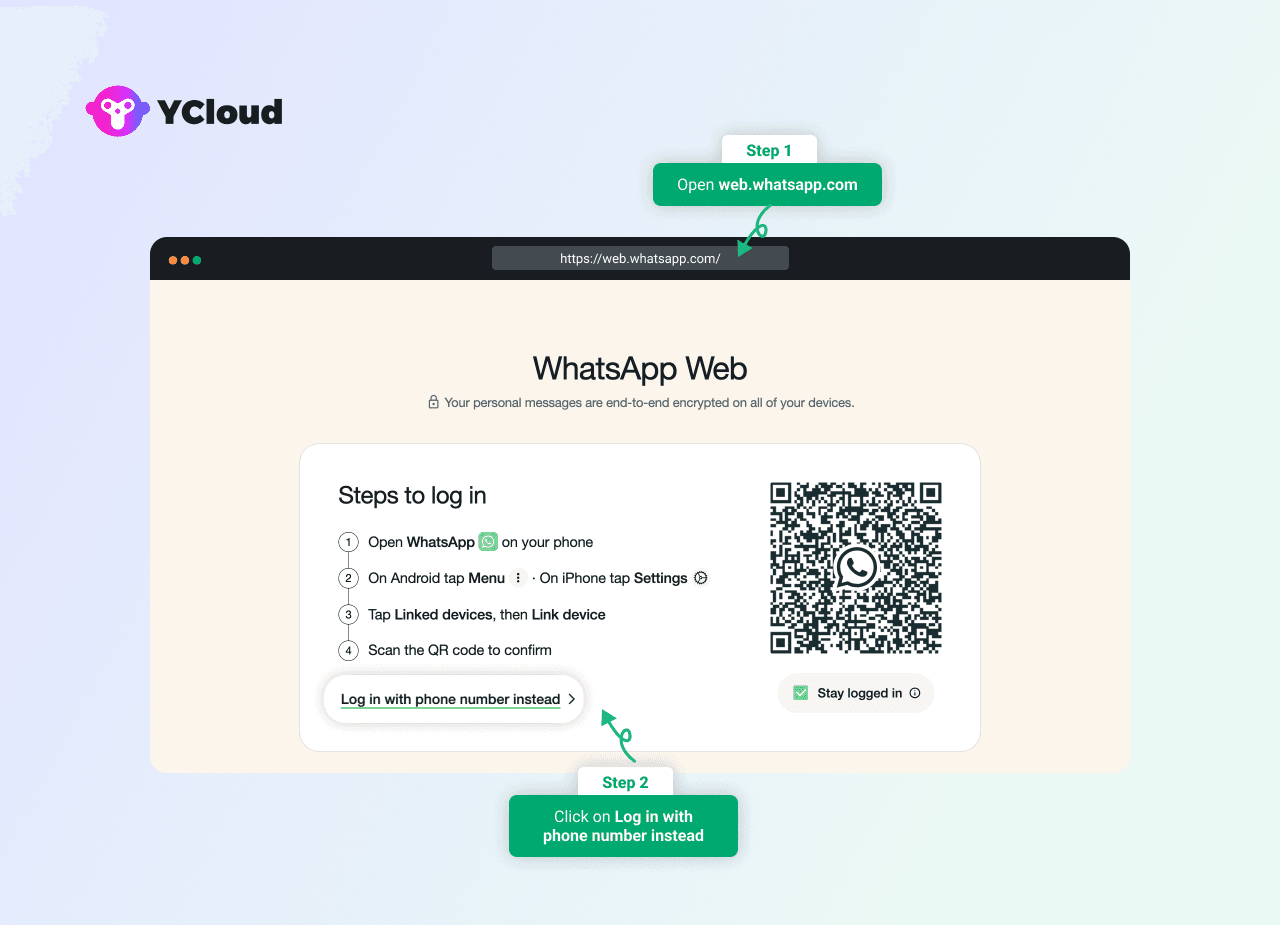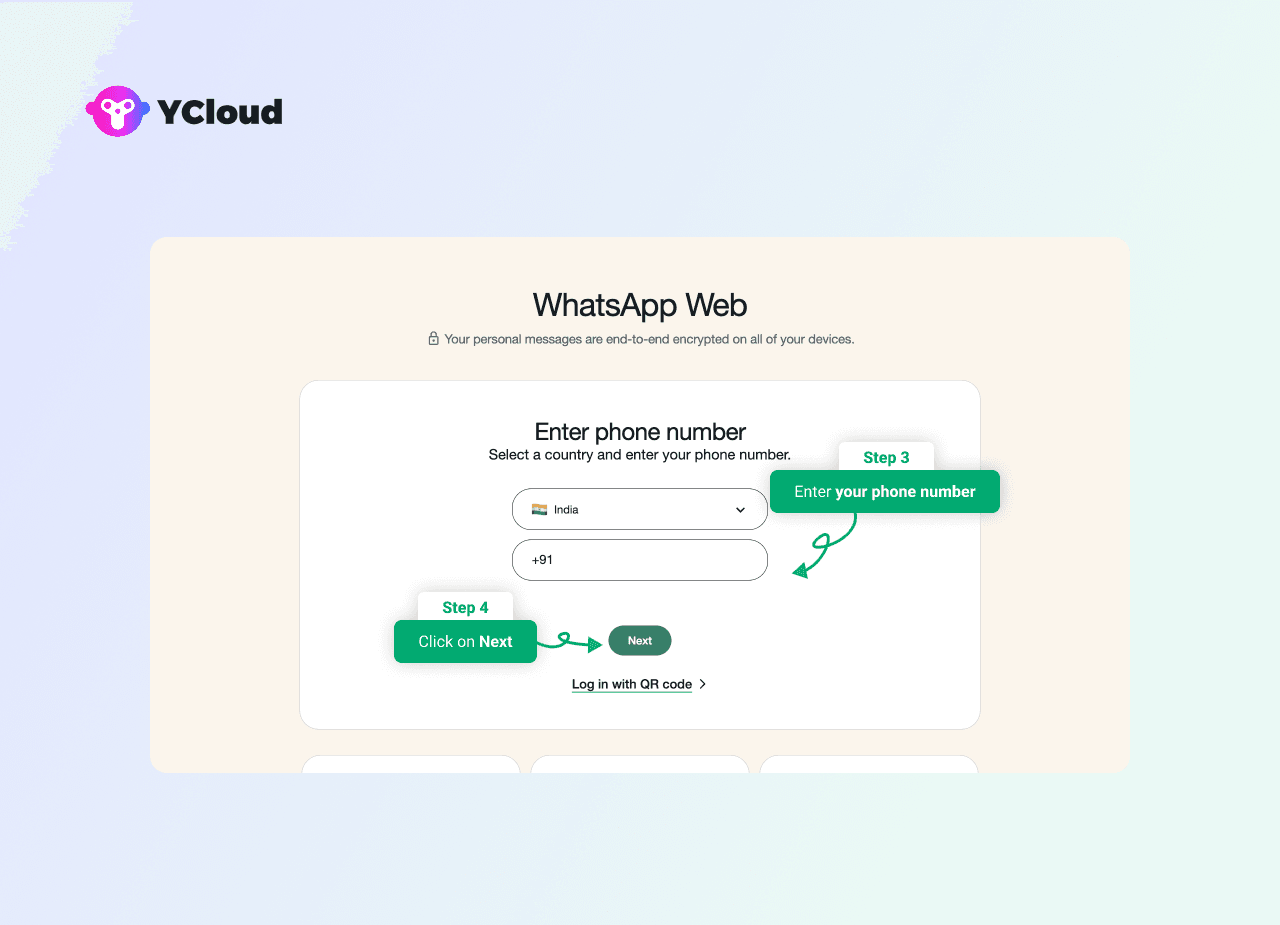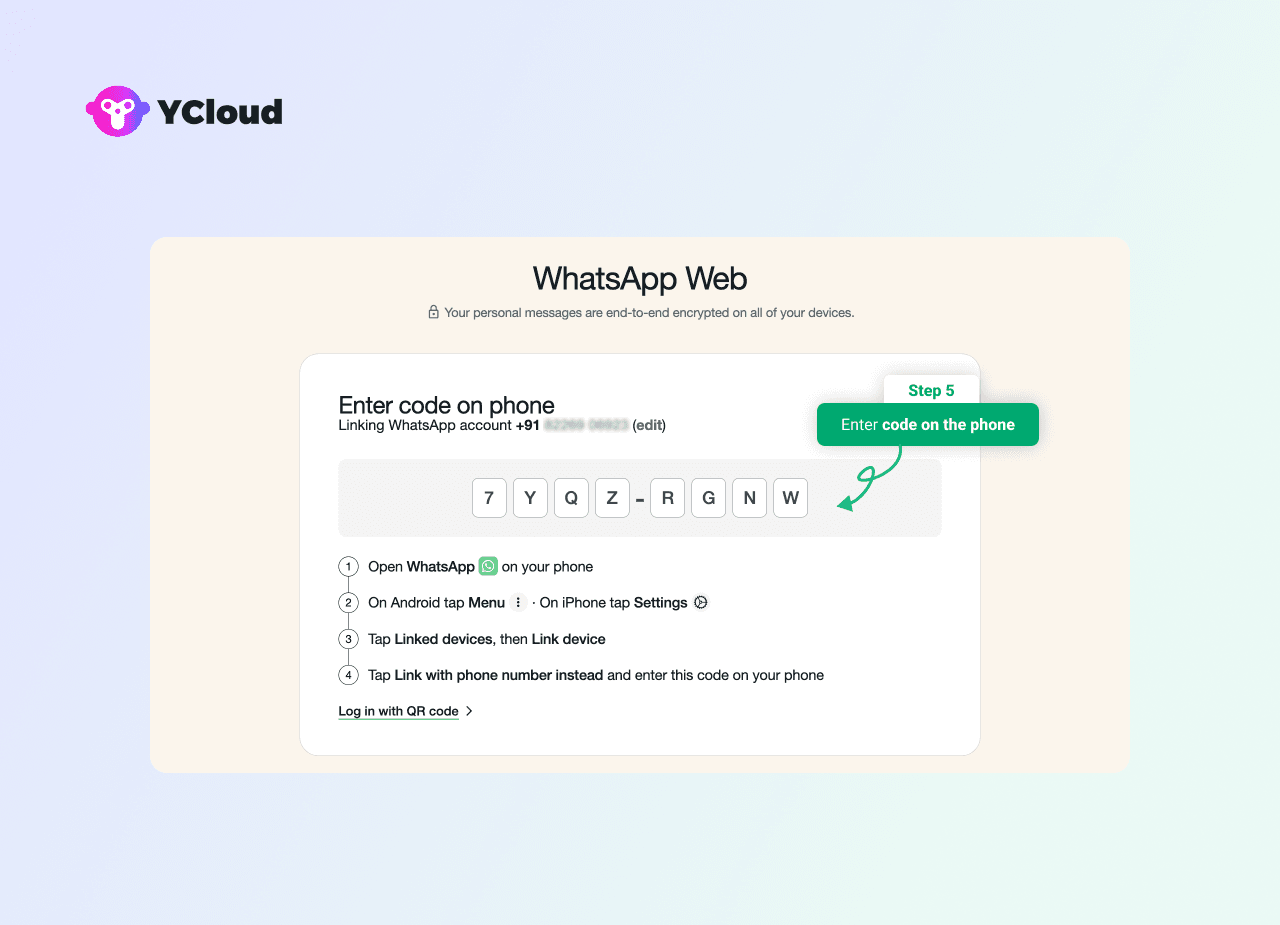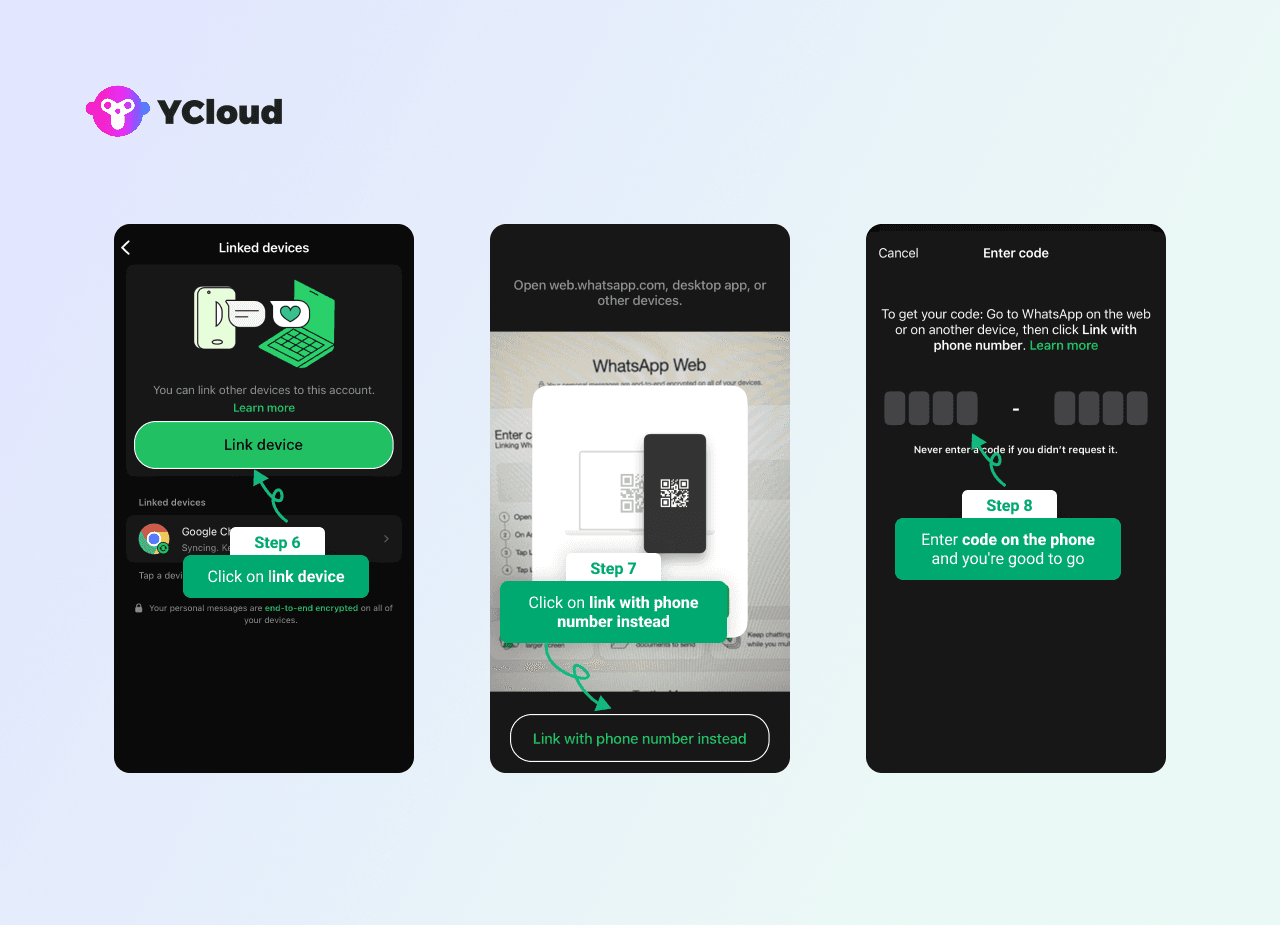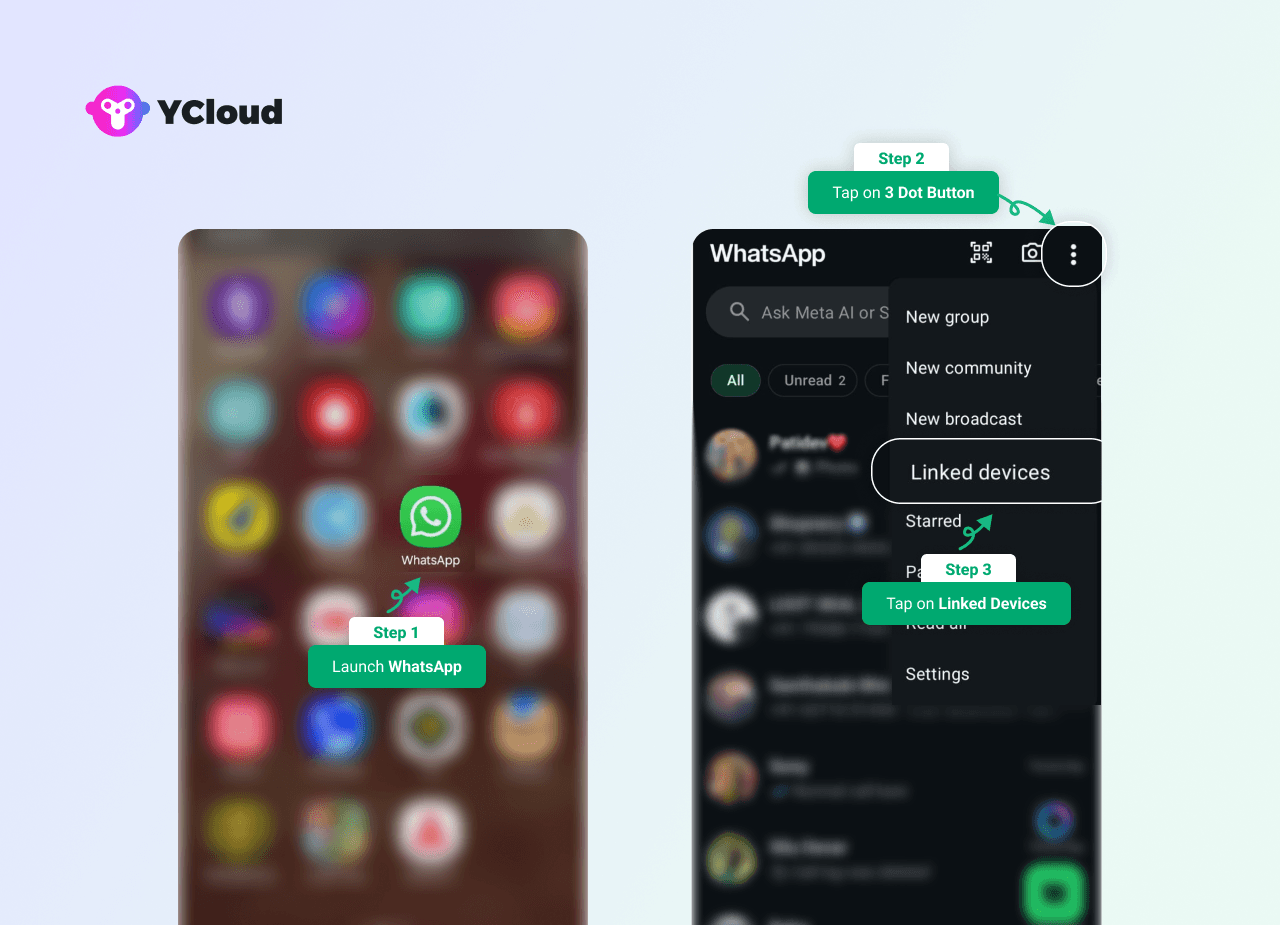WhatsApp Login Made Easy: Easy Steps for Mobile, Web & Desktop
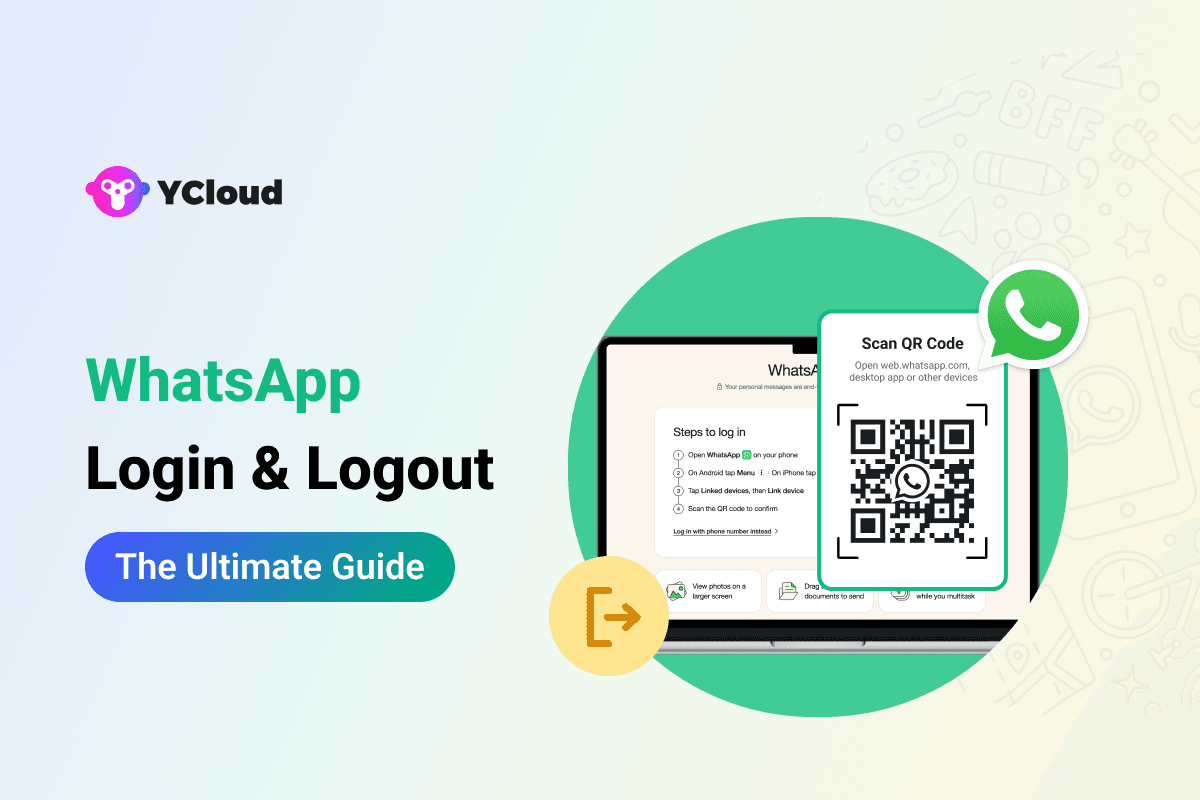
Logging into WhatsApp should be simple! But for many businesses juggling multiple devices, accounts, and teams, it often feels confusing. Should you use the mobile app, WhatsApp Web, or the desktop app? Can you log in without your phone? And what happens if the login doesn’t work?
- Sales teams often need access on both mobile and desktop
- Support teams rely on WhatsApp Web during shifts,
- Managers need to switch accounts without losing conversations.
Add login errors, QR code issues, or security concerns into the mix, and suddenly something as basic as WhatsApp login feels complicated.
That’s exactly what this guide is here to solve! We’ll walk you through every possible way to login and logout of WhatsApp, whether you’re on Android, iPhone, desktop, or browser. You’ll also learn how to use WhatsApp Web with or without QR codes, keep your sessions secure, and troubleshoot common issues. Finally, we’ll touch on how businesses can go beyond simple login with the WhatsApp Business API.
But before we jump right into it, let’s first start with the basics, that is, “prerequisites you need before a WhatsApp login”.
So, without further ado let's get started...
Quick Fact
WhatsApp now lets you use a single WhatsApp or WhatsApp Business account on up to 5 devices (1 Smartphone + 4 PCs). But if you subscribe to Meta Verified in your WhatsApp Business account, then you can connect up to 10 devices and keep them active even when your primary phone is offline.
Prerequisites for WhatsApp Login
Before you can log in to WhatsApp, whether on mobile, web, or desktop, a few basics need to be in place. Skipping these can cause setup errors or failed logins, so it’s worth ticking them off first:
1. Stable Internet Connection
WhatsApp won’t work without a reliable connection. Make sure your device is connected to Wi-Fi or has mobile data enabled. A quick way to check is by opening a browser or streaming a short video to test the speed or directly go to the internet speed test tool to check the speed.
2. Updated Operating System
Running an outdated iOS or Android version can block app features or cause crashes. Head to your phone’s settings, check for software updates, and install any pending ones. Keeping your OS updated ensures smooth performance and better security.
3. Download & Install WhatsApp
If you haven’t already, head to the App Store (iPhone) or Google Play Store (Android) and download the official WhatsApp Messenger app (green chat bubble icon). Installation takes just a few minutes.
With these prerequisites out of the way, you’re ready to move on. Next, let’s look at how to log in to WhatsApp Web using your phone number.
WhatsApp Login on Web Browser Using Your Phone Number
If you don’t want to bother yourself with scanning QR codes, WhatsApp now makes it easy to log in directly on your browser with just your phone number. This is especially handy for businesses that switch devices often or want a faster way to access WhatsApp Web.
Just follow these 3 simple steps to get started:
Step 1: Open WhatsApp Web on Your PC
Go to web.whatsapp.com in your browser. Click on the option that says “Link with phone number.”
Step 2: Add Your WhatsApp Number and Tap Next
Enter your registered WhatsApp number in the box provided, then tap “Next.”
Step 3: Enter the Code on Your WhatsApp Mobile App
A verification code will appear on your browser screen. Open WhatsApp on your phone and then acknowledge the prompt that says “Are you trying to link a device?”, now enter this code, and your account will be instantly linked.
✅ That’s it! Your chats will now seamlessly load in the browser, ready for you to use.
Up next, we’ll cover how to log in to WhatsApp Web through a QR code scan from an Android device.
WhatsApp Web Login with QR Code from an Android Smartphone
For Android users, the simplest way to access WhatsApp Web is by scanning the WhatsApp login QR code. It’s fast, secure, and allows you to continue conversations from your computer without missing a beat.
Here’s how to set it up:
Step 1: Open WhatsApp on Your Android Phone
Unlock your phone and open WhatsApp or WhatsApp Business App. Tap the three dots in the top-right corner to open the menu.
Step 2: Go to ‘Linked Devices’ and Tap ‘Link a Device’
From the menu, select Linked Devices, then tap Link a Device. Your phone may ask you to confirm with a fingerprint, PIN, or pattern verification for security before opening the QR scanner.
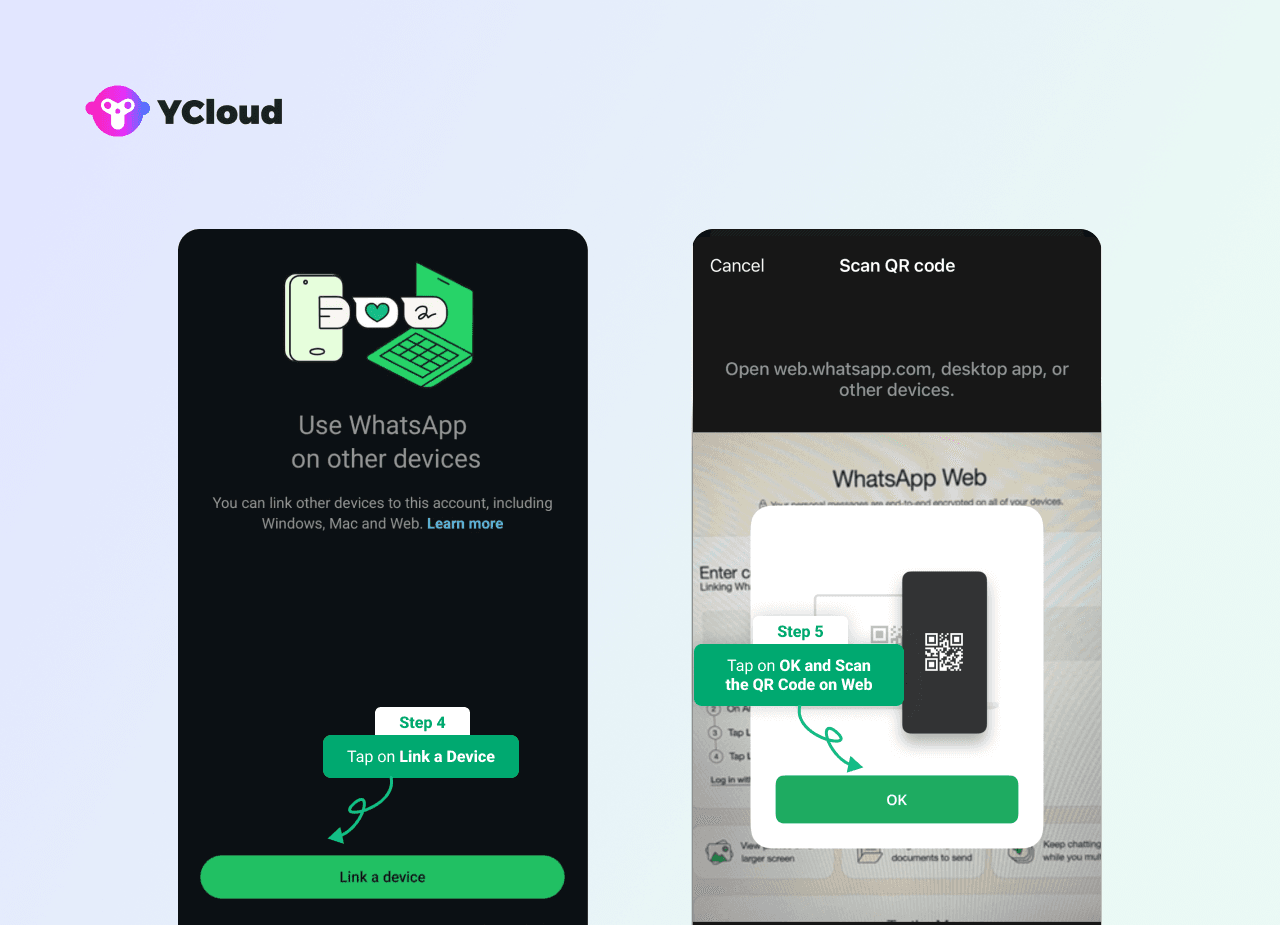
Step 3: Open WhatsApp Web on Your Computer
On your desktop browser (Chrome, Firefox, Edge, or Safari), go to web.whatsapp.com. You’ll see a large QR code displayed on the page.
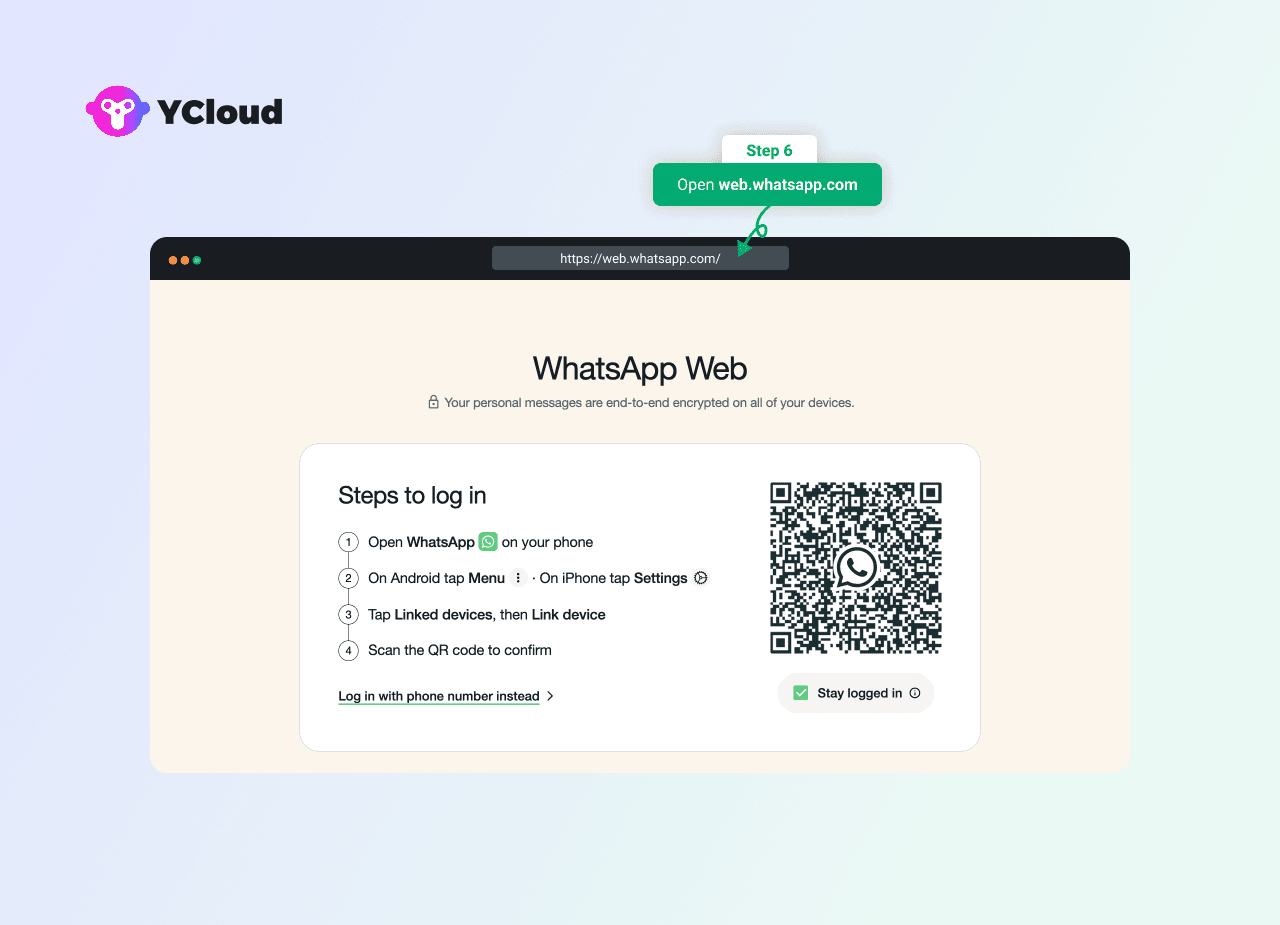
Step 4: Scan the QR Code from Your Phone
Point your phone’s camera at the QR code on the screen. Make sure the entire code fits within the scanner frame. Once the code is scanned, your WhatsApp account will instantly sync, and chats will appear on your browser.
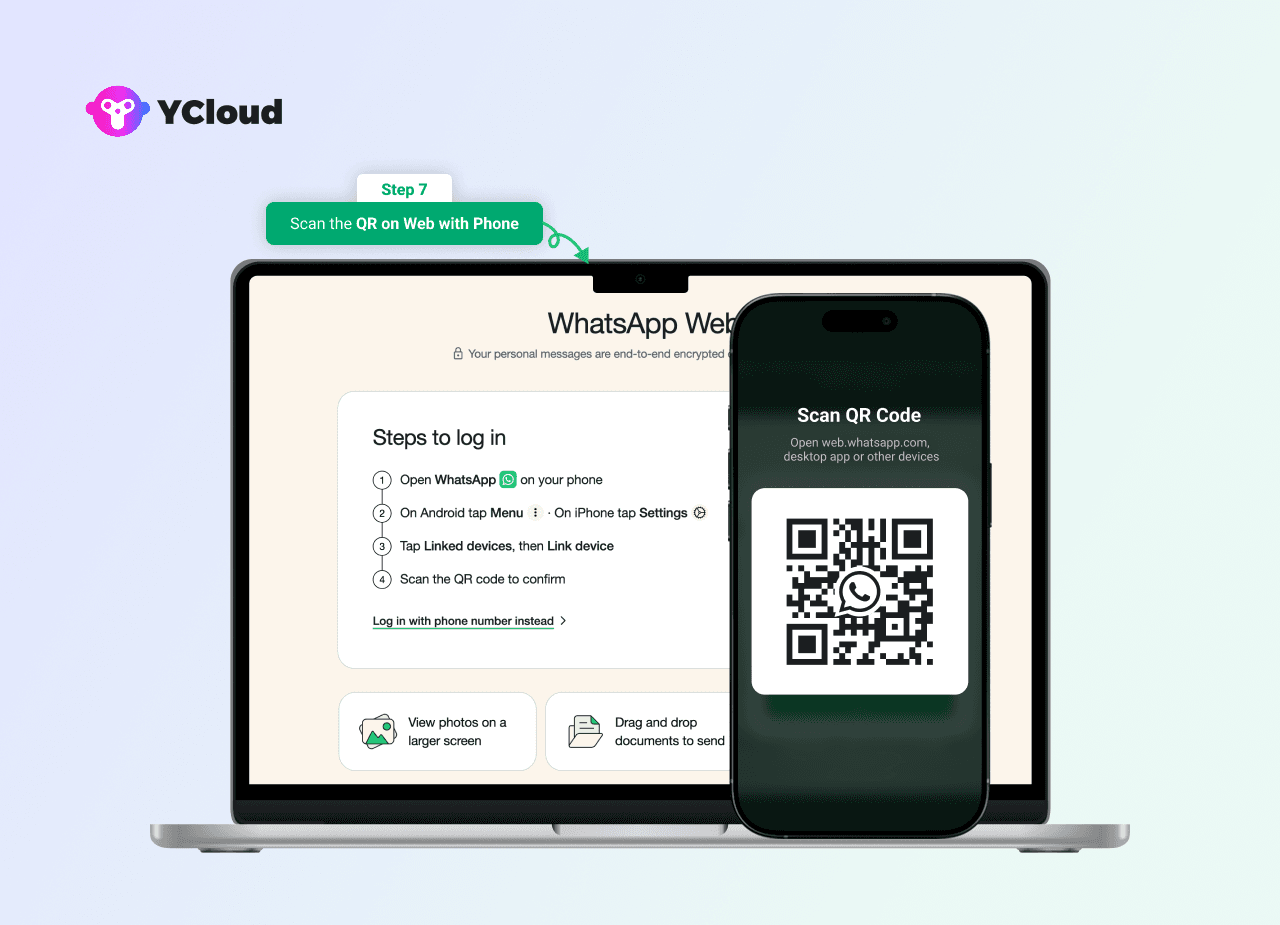
✅ That’s it! You’re now connected to WhatsApp Web through your Android device, and you can chat, share files, or even make calls directly from your computer.
💡 Pro Tips:
- Tick the “Keep me signed in” box on the browser login page if you’re on a personal device. This saves you from scanning the QR code every time.
- Ensure your phone stays connected to the internet; otherwise, WhatsApp Web will disconnect.
- For added security, unlink devices you no longer use via Linked Devices in the app.
Up next, let’s walk through how to log in to WhatsApp Web from an iPhone.
WhatsApp Web Login with QR Code from an iPhone
For iPhone users, the process of logging into WhatsApp Web looks slightly different compared to Android. Instead of the three-dot menu, you’ll be working through the Settings tab.
Here’s how you can do it:
Step 1: Open WhatsApp on Your iPhone
Open WhatsApp or WhatsApp Business App on your iPhone. Tap on Settings at the bottom-right corner of the screen.
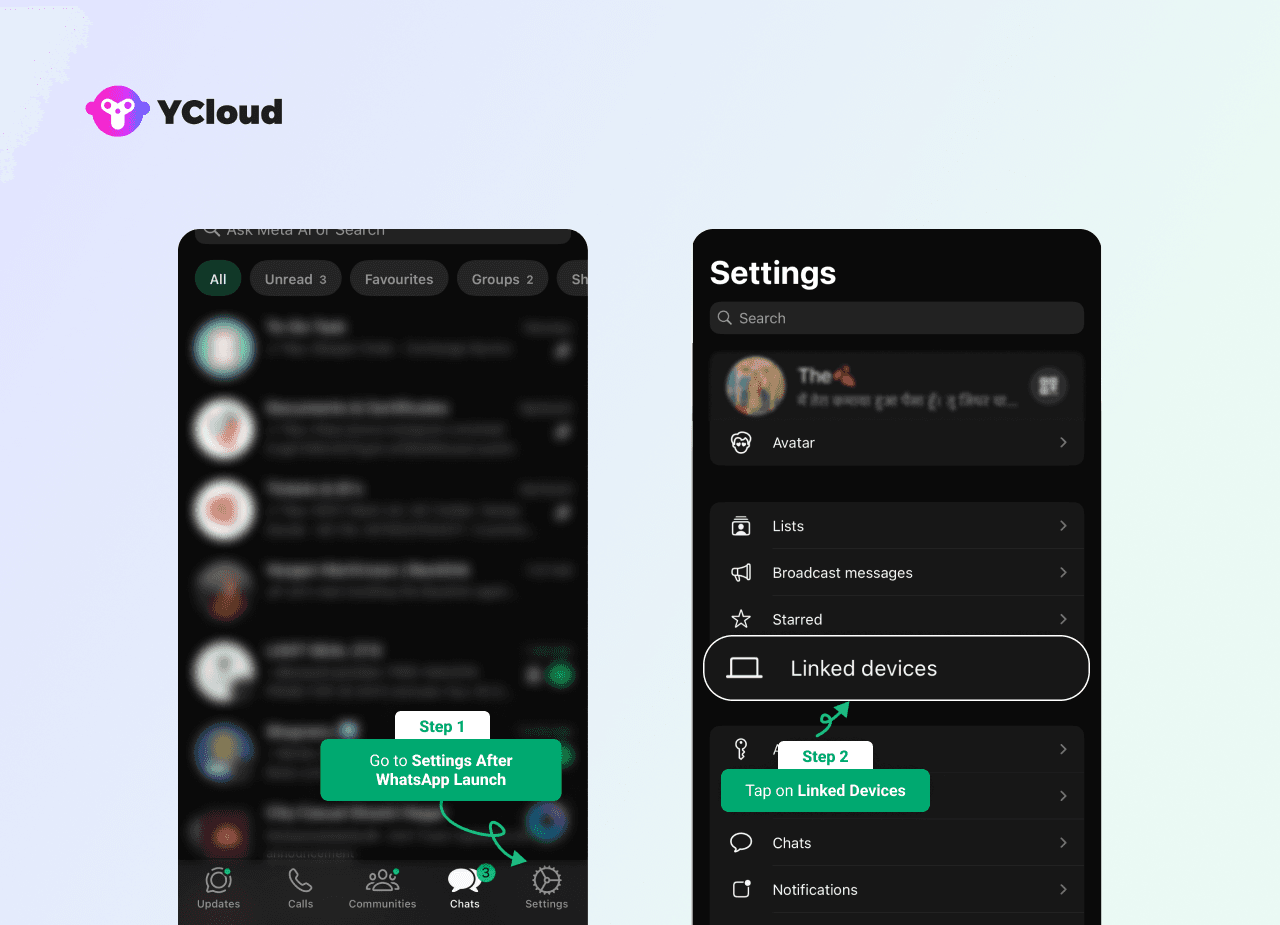
Step 2: Go to ‘Linked Devices’ and Select ‘Link a Device’
Tap Linked Devices, then press Link a Device. Your iPhone may prompt you to confirm with Face ID, Touch ID, or passcode before the QR scanner opens.
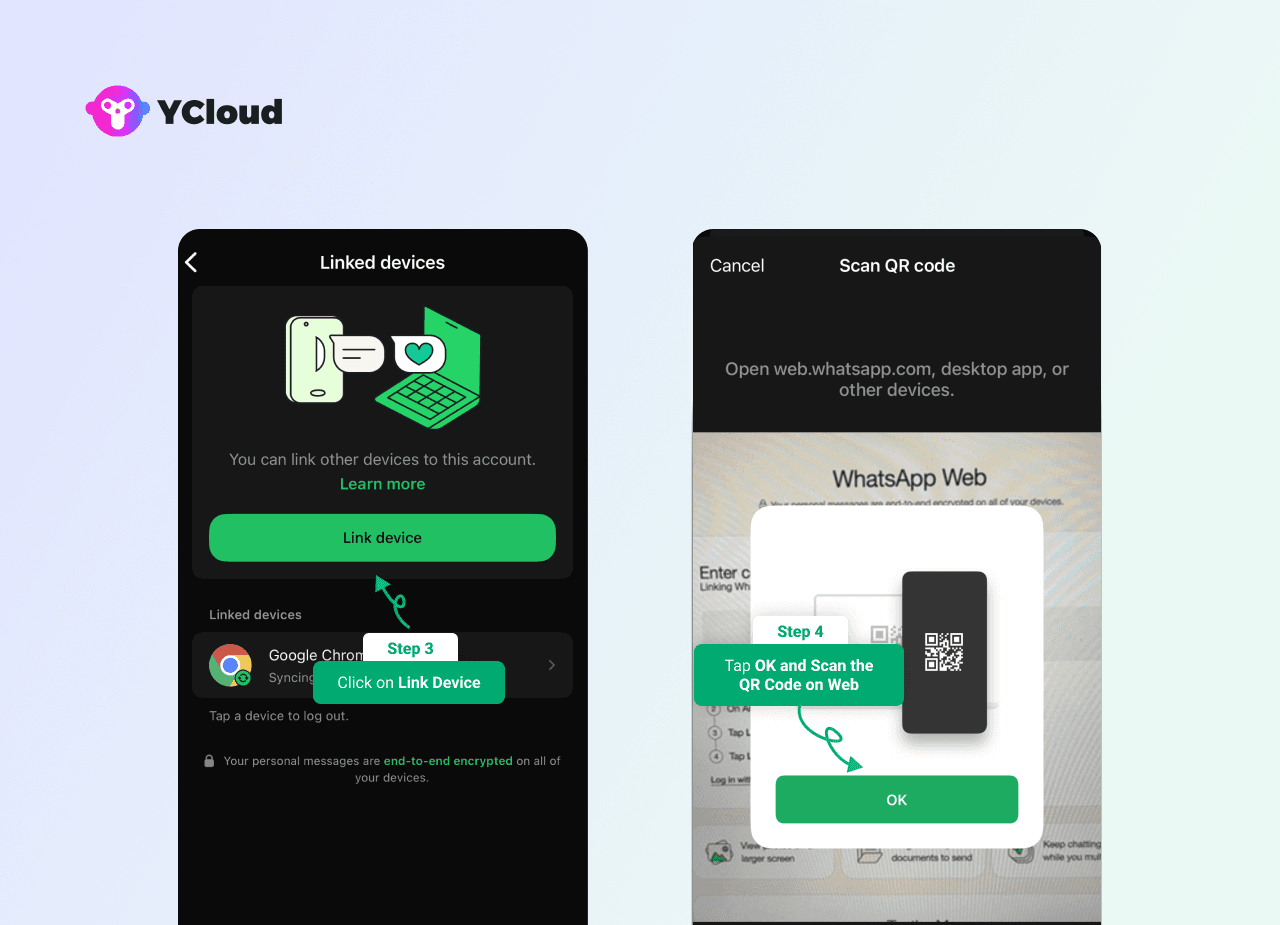
Step 3: Open WhatsApp Web on Your Computer
On your desktop browser (Safari, Chrome, Edge, or Firefox), visit web.whatsapp.com. A QR code will appear on the page.
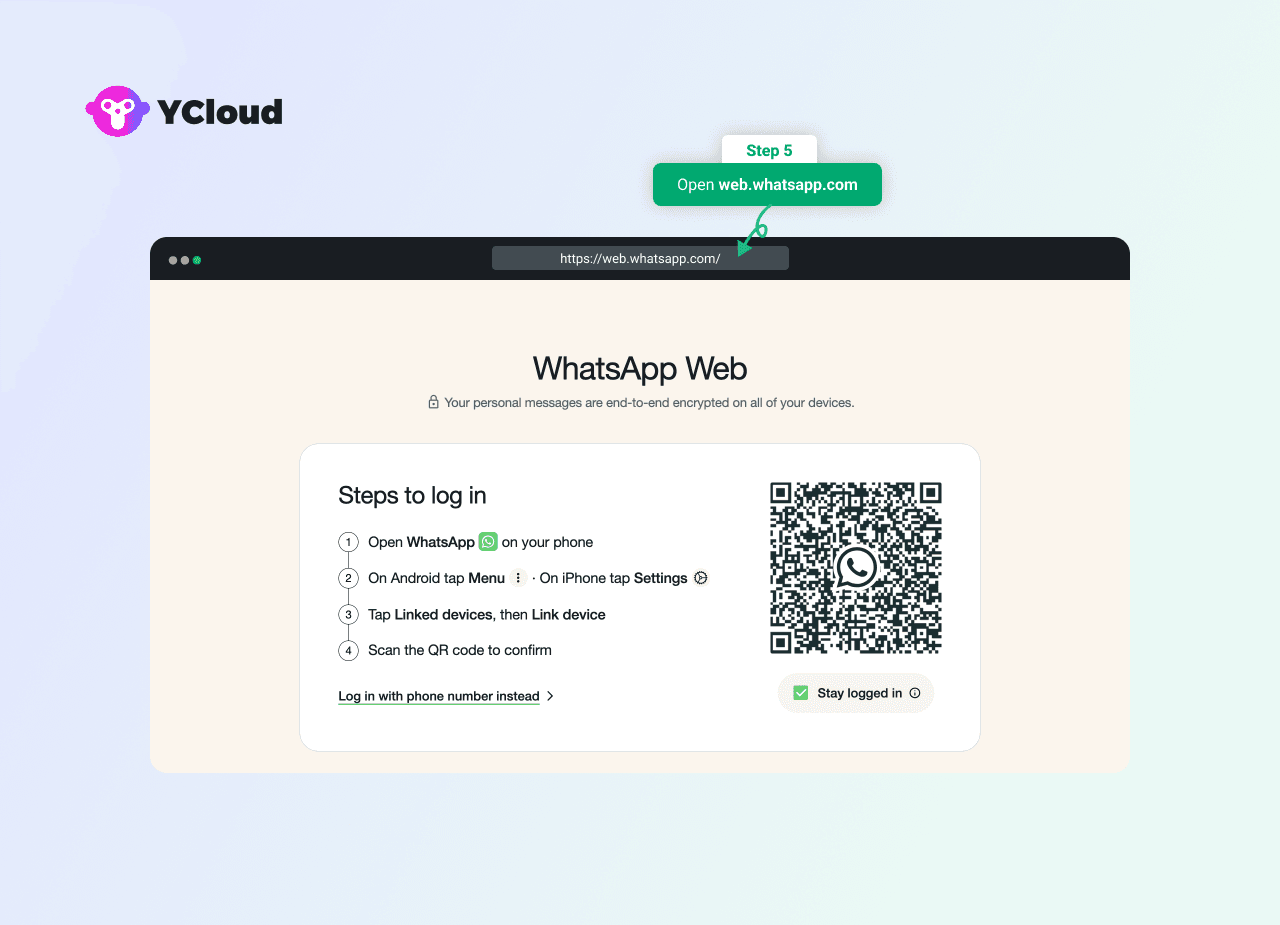
Step 4: Scan the QR Code Using Your iPhone
Hold your iPhone up to the computer screen and align the camera with the QR code. Once scanned, your WhatsApp chats will instantly load in the browser.
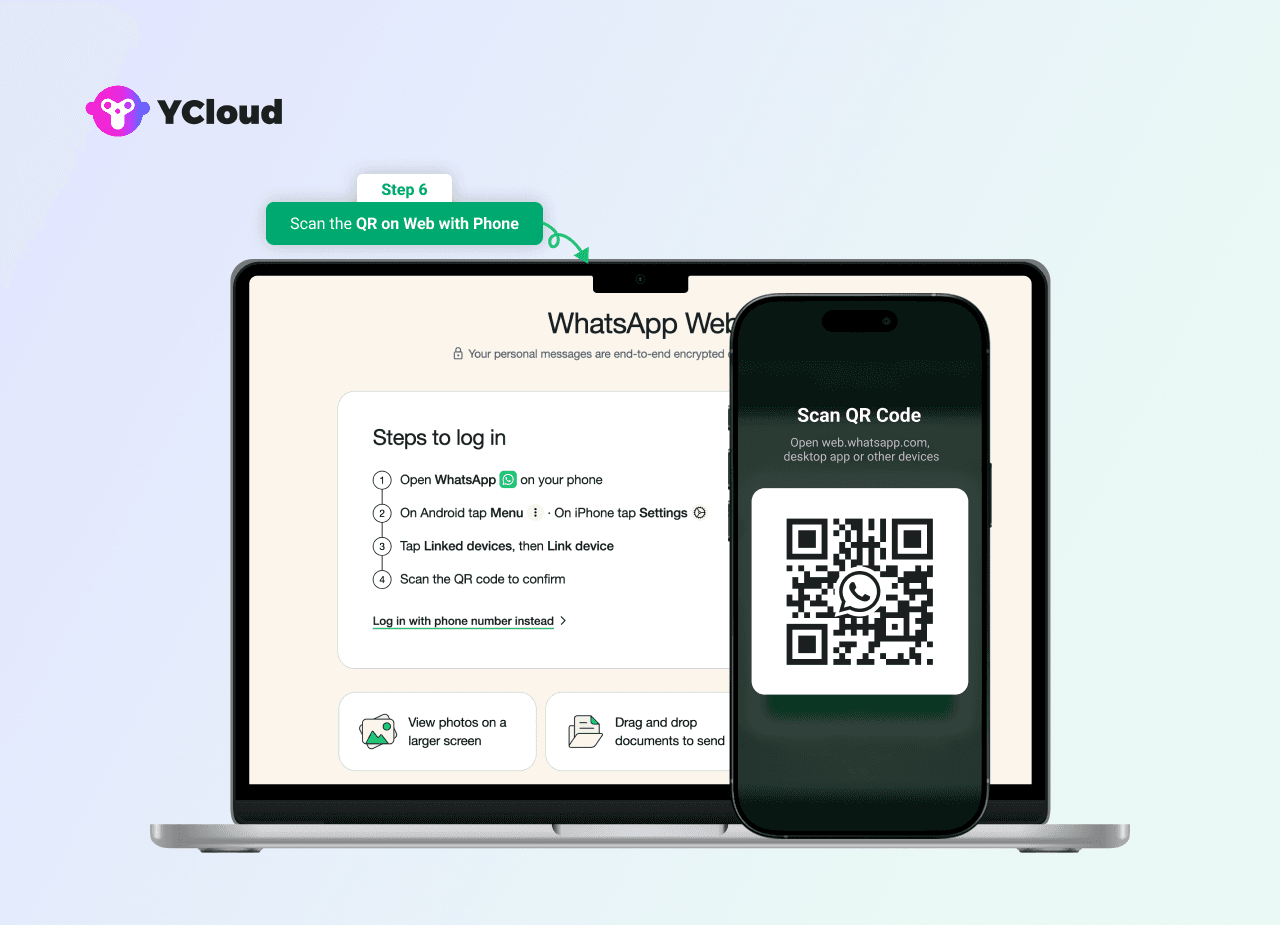
✅ That’s it! You’re now successfully logged into WhatsApp Web via your iPhone.
💡 Pro Tips:
- If you’re on your personal device, check “Keep me signed in” on the browser before scanning. This saves you from repeating the QR scan every time.
- If you use multiple browsers, note that only one active browser session can stay linked at a time.
- To log out remotely, go back to Linked Devices on your iPhone and unlink the browser.
Up next, let’s look at how to log in to the WhatsApp Desktop App on Windows and Mac.
WhatsApp Login on Desktop Apps (Windows & Mac)
For those who prefer a dedicated desktop experience, WhatsApp offers a native app for both Windows and Mac. It’s smooth, fast, and eliminates the need to open a browser every time you want to log in.
Here’s how to set it up:
Step 1: Download the WhatsApp Desktop App
On your computer, visit whatsapp.com/download. Choose “Download for Windows” or “Download for Mac” depending on your computer.
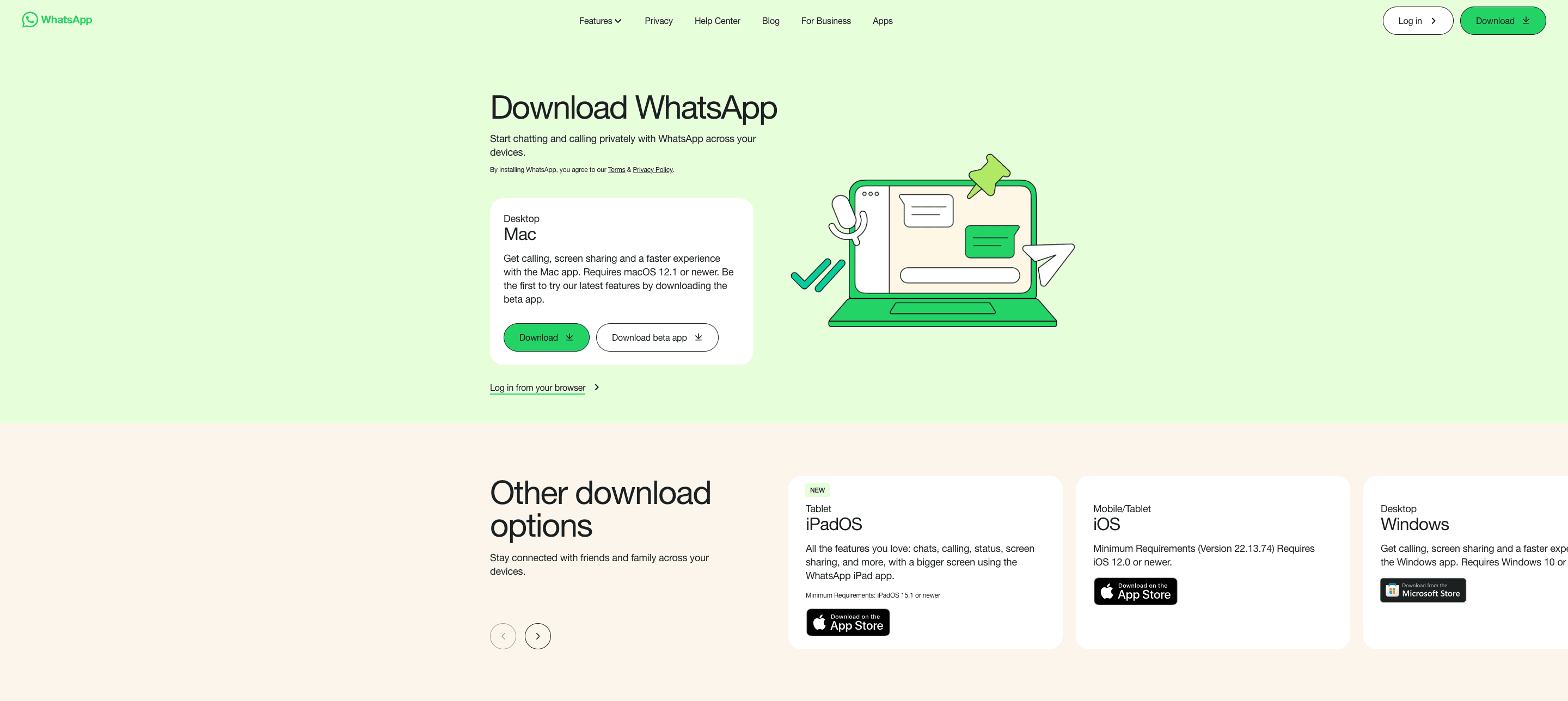
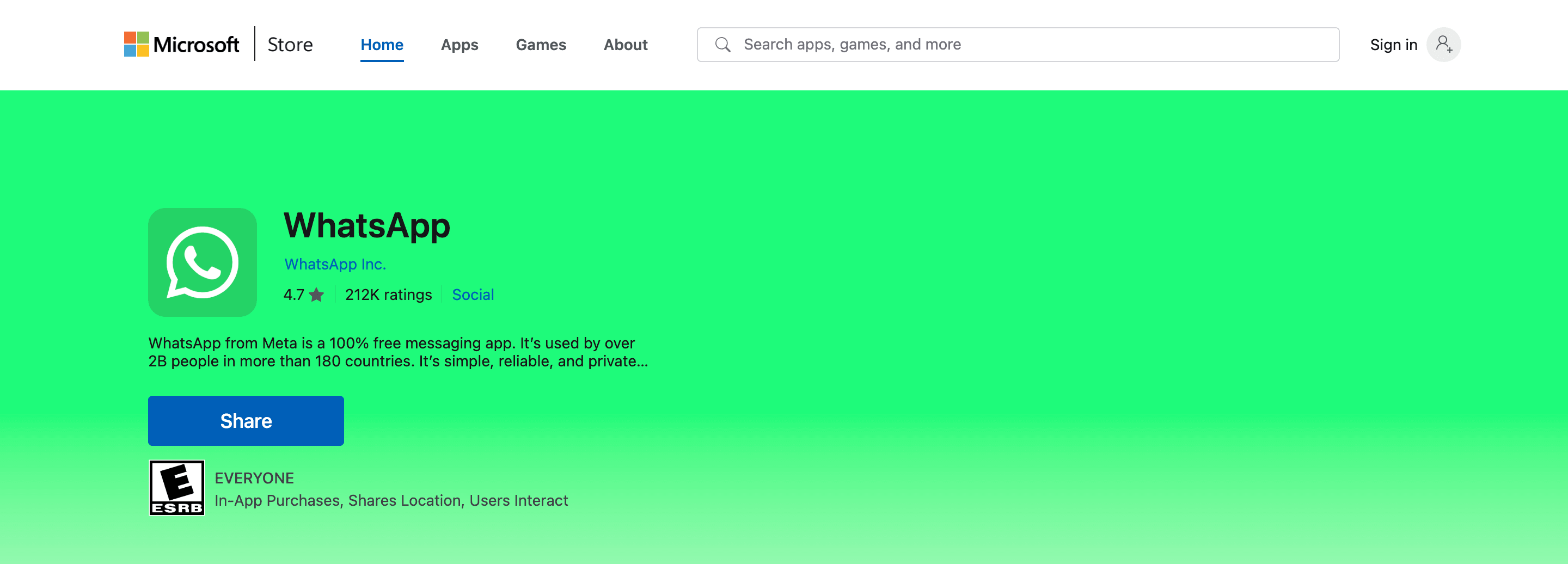
Step 2: Install the App
Once the file is downloaded, open it and follow the on-screen instructions to complete the installation. When done, launch the WhatsApp Desktop app.
Step 3: Open WhatsApp on Your Phone
Unlock your phone and open WhatsApp or WhatsApp Business App.
- On Android, tap the three dots → Linked Devices → Link a Device.
- On iPhone, go to Settings → Linked Devices → Link a Device.
Step 4: Scan the QR Code on Desktop
Your desktop app will display a QR code. Use your phone’s QR scanner (activated in the previous step) to scan this code.
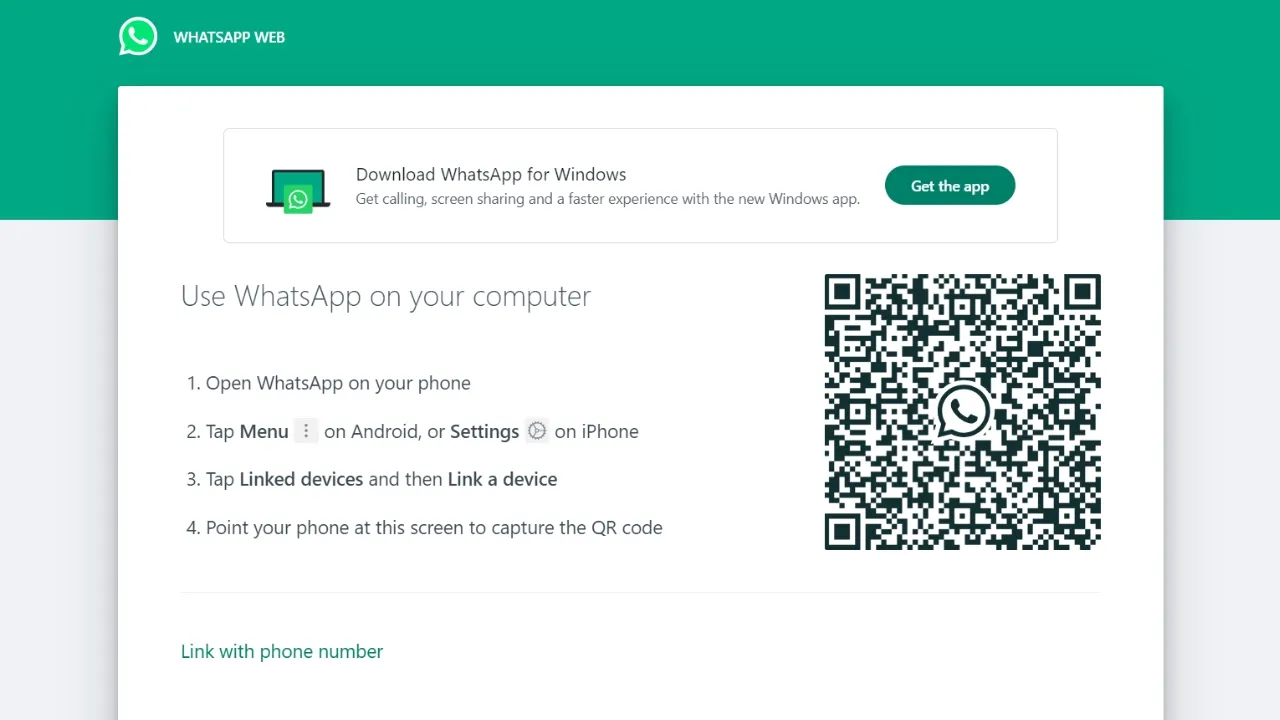
Step 5: Access WhatsApp on Desktop
Once scanned, your chats will instantly sync, and you can send messages, share files, and manage conversations right from your computer.
✅ That’s it! You’re now logged into the WhatsApp Desktop app, which gives you a cleaner, more app-like experience than the web version.
💡 Pro Tips:
- If you work across multiple monitors, the desktop app is more convenient than a browser tab.
- The app supports desktop notifications, so you won’t miss messages even if the window is minimized.
- Just like WhatsApp Web, your phone must remain connected to the internet for the desktop app to work.
- To log out, open the desktop app, click on Menu > Log out, or unlink the device from your phone’s Linked Devices section.
WhatsApp Web vs WhatsApp Desktop: Which One Should You Use?
WhatsApp Web | WhatsApp Desktop App |
Works directly in your browser (no installation needed). | Requires download & installation. |
Best for quick access on shared or temporary devices. | Best for daily use on your personal work computer. |
Needs manual login (unless you check “Keep me signed in”). | Stays logged in once linked, fewer disruptions. |
Limited in features like notifications and multitasking. | Offers smoother notifications, keyboard shortcuts, and faster performance. |
👉 B2B Tip: If your team uses WhatsApp daily for sales or support, the Desktop app is the smarter choice. If you only need occasional access, WhatsApp Web does the job.
Up next, let’s explore how to log in to WhatsApp Web without a smartphone.
WhatsApp Web Login Without a Smartphone
Until recently, using WhatsApp Web meant your phone had to stay connected to the internet at all times. Thanks to WhatsApp’s multi-device update, you can now continue using WhatsApp Web independently, even if your phone is offline, out of battery, or switched off. You’ll still need your phone for the initial setup, but after that, WhatsApp Web works on its own.
Here’s how to set it up:
Step 1: Open WhatsApp on Your Phone
Launch WhatsApp or WhatsApp Business App on your mobile device.
Step 2: Go to ‘Linked Devices’
- On Android: Tap the three dots → Linked Devices
- On iPhone: Open Settings → Linked Devices
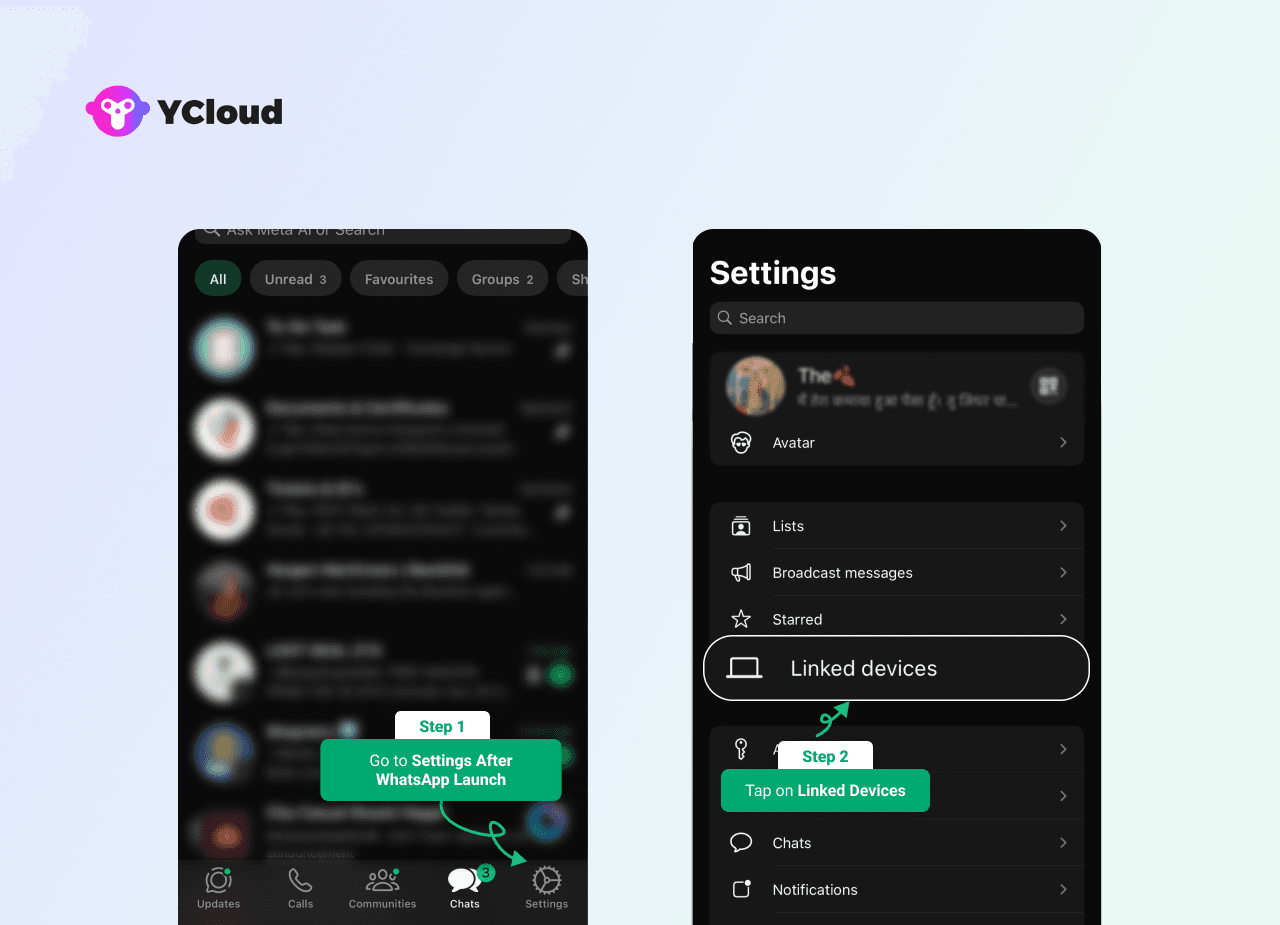
Step 3: Tap ‘Link a Device’
Confirm your identity if prompted (Face ID, Touch ID, fingerprint, or PIN). A QR scanner will open.
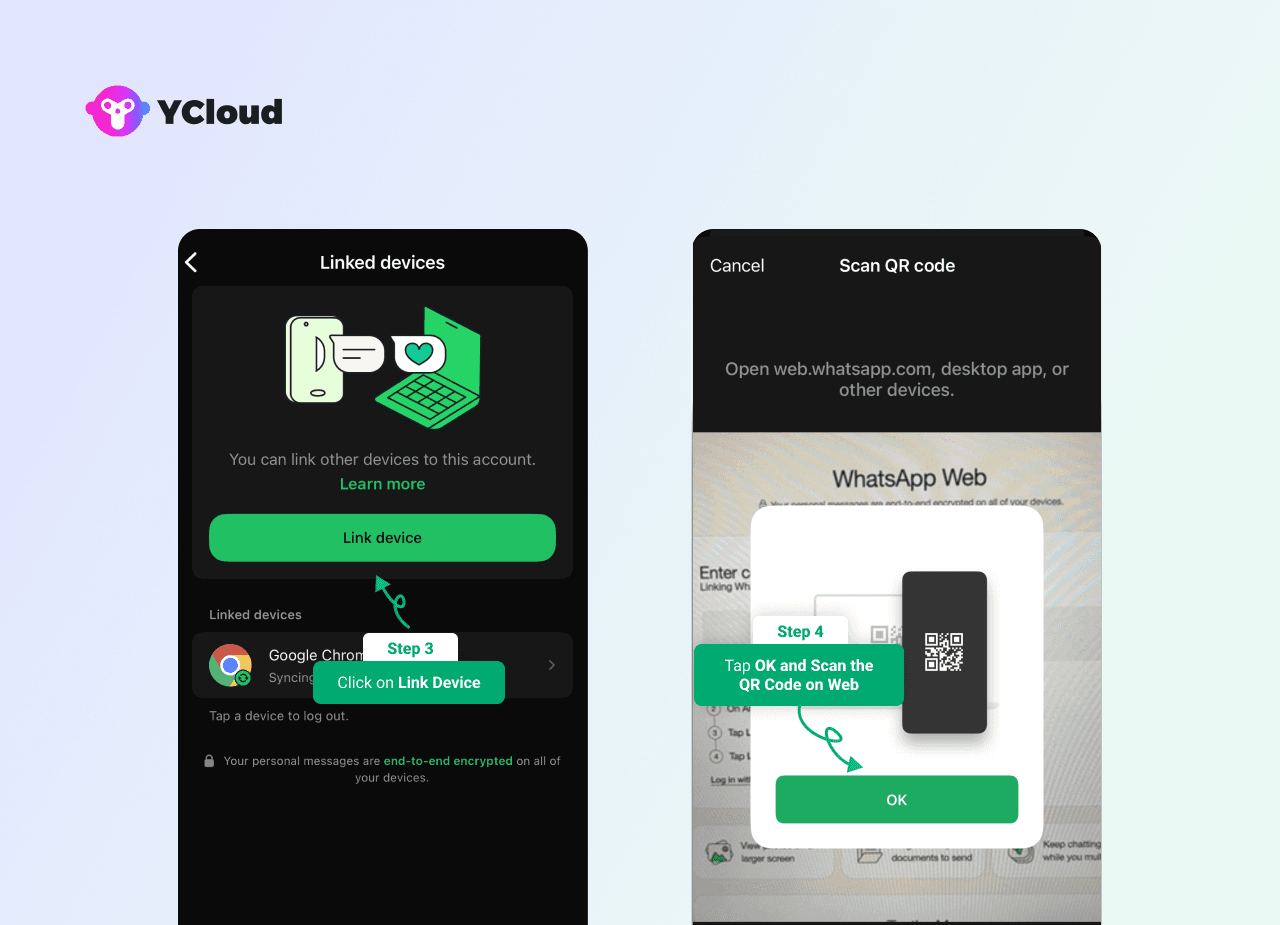
Step 4: Open WhatsApp Web on Your Computer
On your desktop browser, go to web.whatsapp.com. A QR code will be displayed.
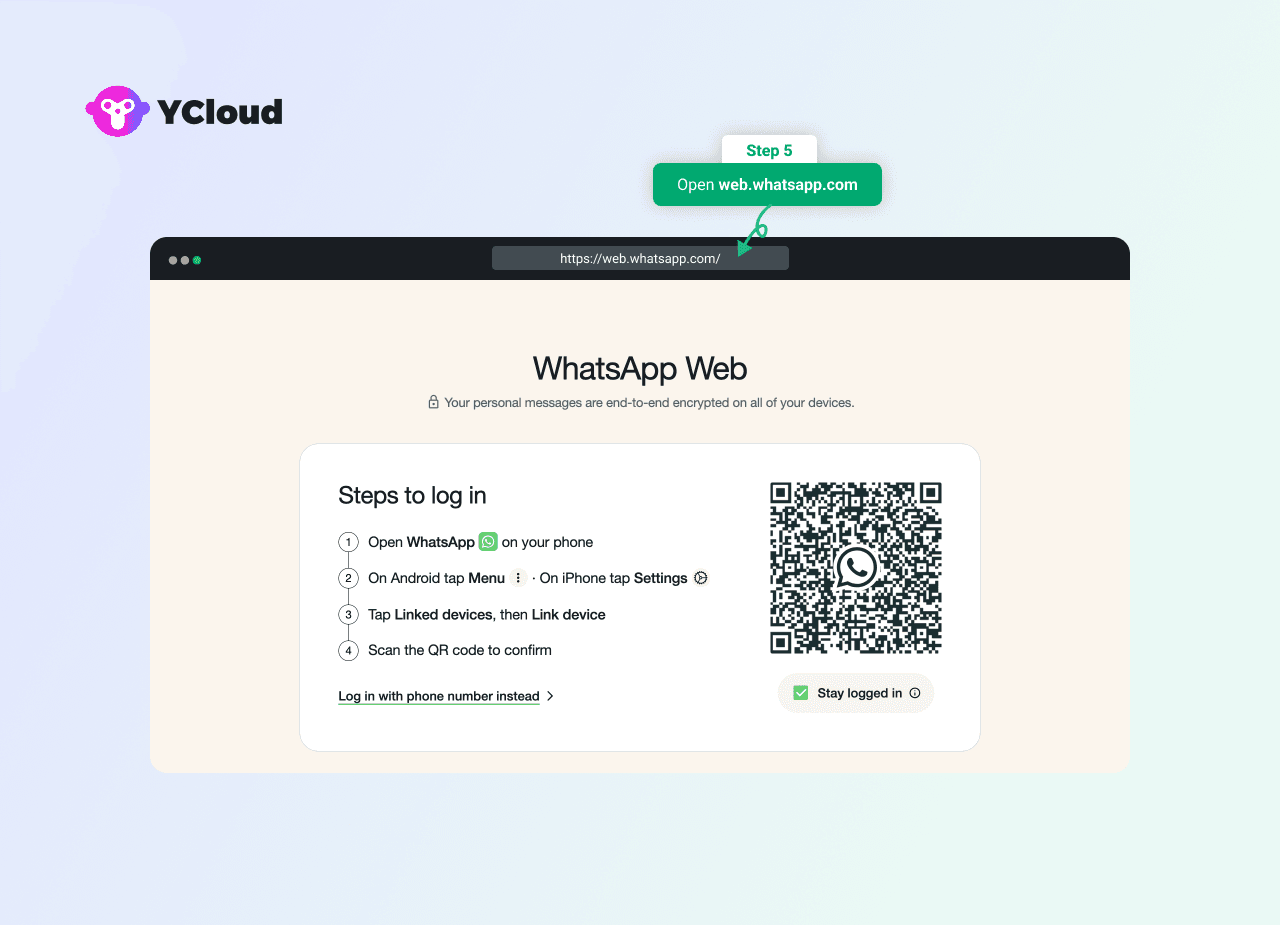
Step 5: Scan the QR Code from Your Phone
Use your mobile QR scanner to scan the code. Once linked, your chats will appear on your desktop. Even if your phone goes offline, WhatsApp Web will keep working.
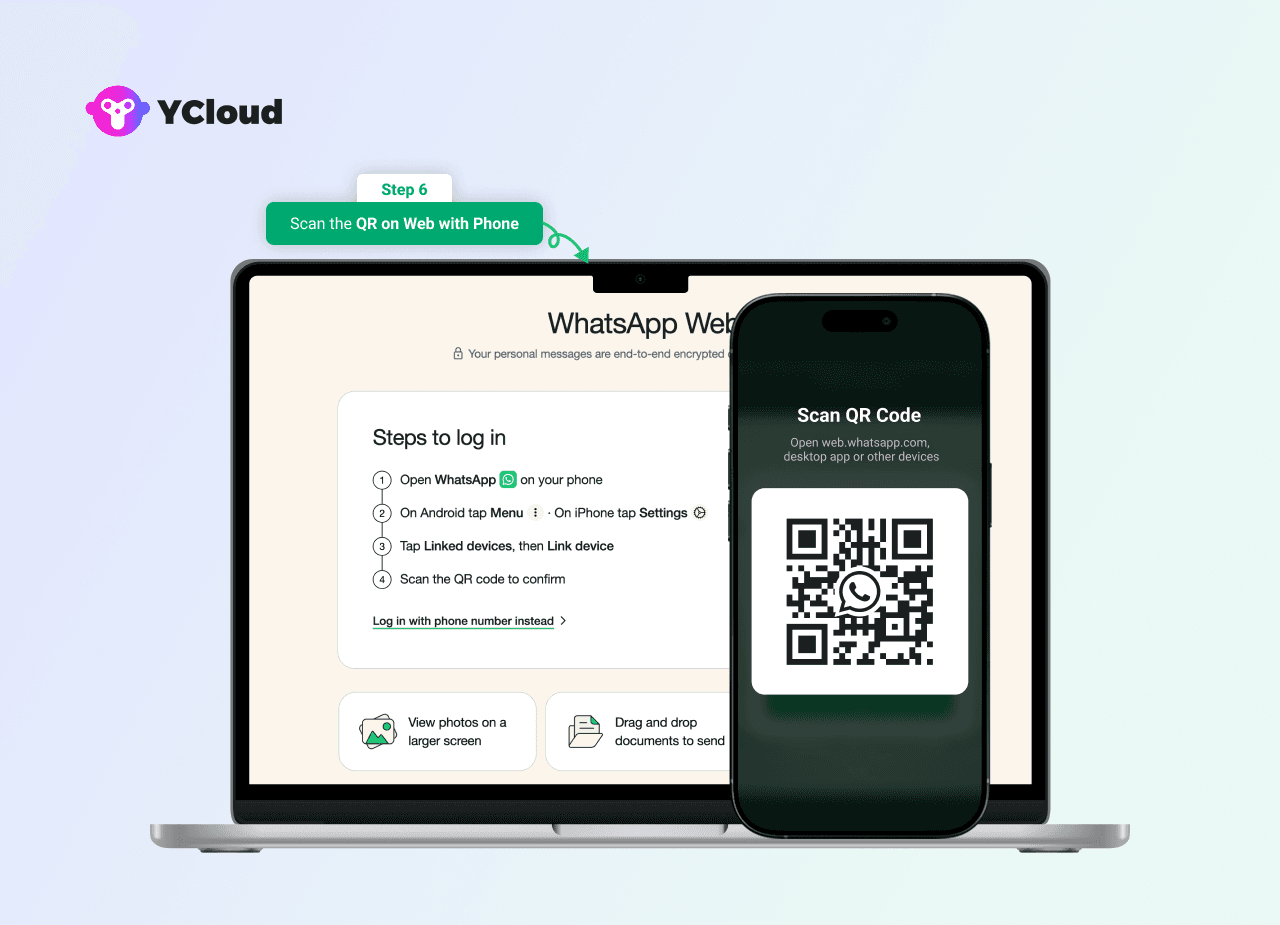
✅ That’s it! You can now use WhatsApp Web without needing your phone to stay connected.
💡 Pro Tips:
- You can link up to 4 additional devices (including browsers or desktop apps) alongside your main phone.
- If your phone remains inactive for 14 days, all linked devices will automatically log out for security.
- Some features (like status updates, location sharing, or creating new broadcasts) may not be fully supported on linked devices.
- For businesses, this update means teams can respond on desktop without worrying about the manager’s phone staying online.
👉 Up next, let’s look at whether it’s possible to log in to WhatsApp Web without scanning a QR code.
Can You Log in to WhatsApp Web Without a QR Code?
Many users ask if it’s possible to access WhatsApp Web without scanning a QR code. The answer (at least for now) is NO, not officially.
WhatsApp requires a QR scan during the first login to securely link your phone with the web version. This step ensures your account is properly authenticated and prevents unauthorized access.
Even though WhatsApp has introduced multi-device login (allowing Web and Desktop to work without your phone staying online), the initial setup still depends on that QR code scan.
In a nutshell, you can’t bypass QR code login; it’s WhatsApp’s way of keeping your account safe.
⚠️ Important Warning:
Some websites and tools claim to offer “WhatsApp Web login without QR code.” These are not official and often attempt to steal your credentials or compromise your account. For security, always use web.whatsapp.com or the official WhatsApp Desktop app.
💡 Pro Tips:
- Once you’ve scanned the QR code, check “Keep me signed in” on your browser. This way, you won’t need to repeat the scan every time.
- If you use WhatsApp Web frequently, consider installing the WhatsApp Desktop app as it keeps you logged in longer and is more reliable.
- Businesses with shared devices should always log out after use to avoid security risks.
👉 Up next, let’s explore how to log in to WhatsApp on another phone.
How to Login WhatsApp in Another Phone?
With WhatsApp’s Companion Mode, you can now use the same WhatsApp account on two phones, something that wasn’t possible before. This is especially useful for business owners who switch between personal and work phones, or teams that need to share access.
Here’s how to set it up:
Step 1: Download WhatsApp on the New Phone
Install WhatsApp or WhatsApp Business App from the App Store (iPhone) or Google Play Store (Android). Open the app and accept the terms and conditions.
Step 2: Choose ‘Link as Companion Device’
When the app asks for your phone number, tap the three dots (Android) or More options (iPhone) and select “Link as companion device.”
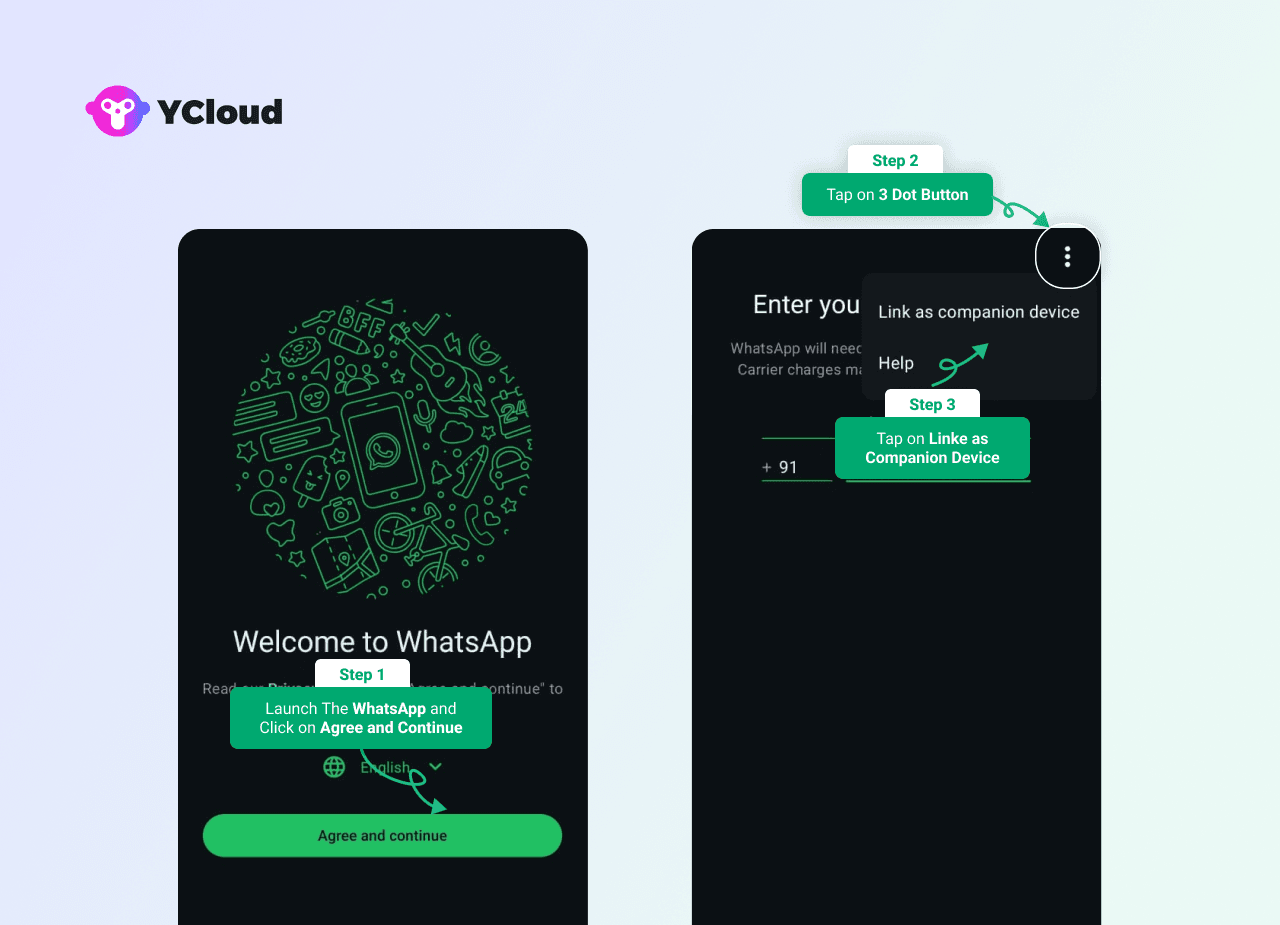
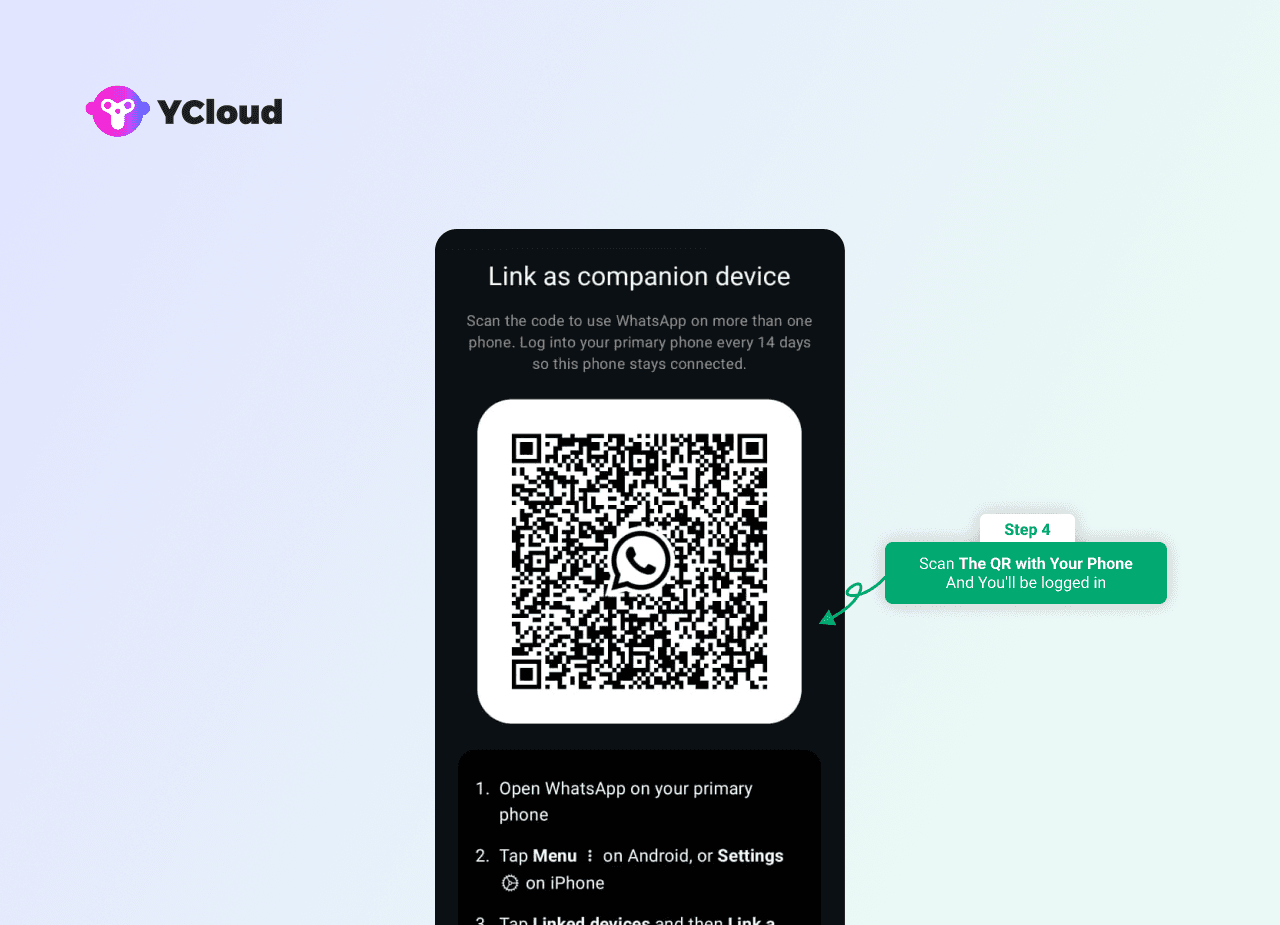
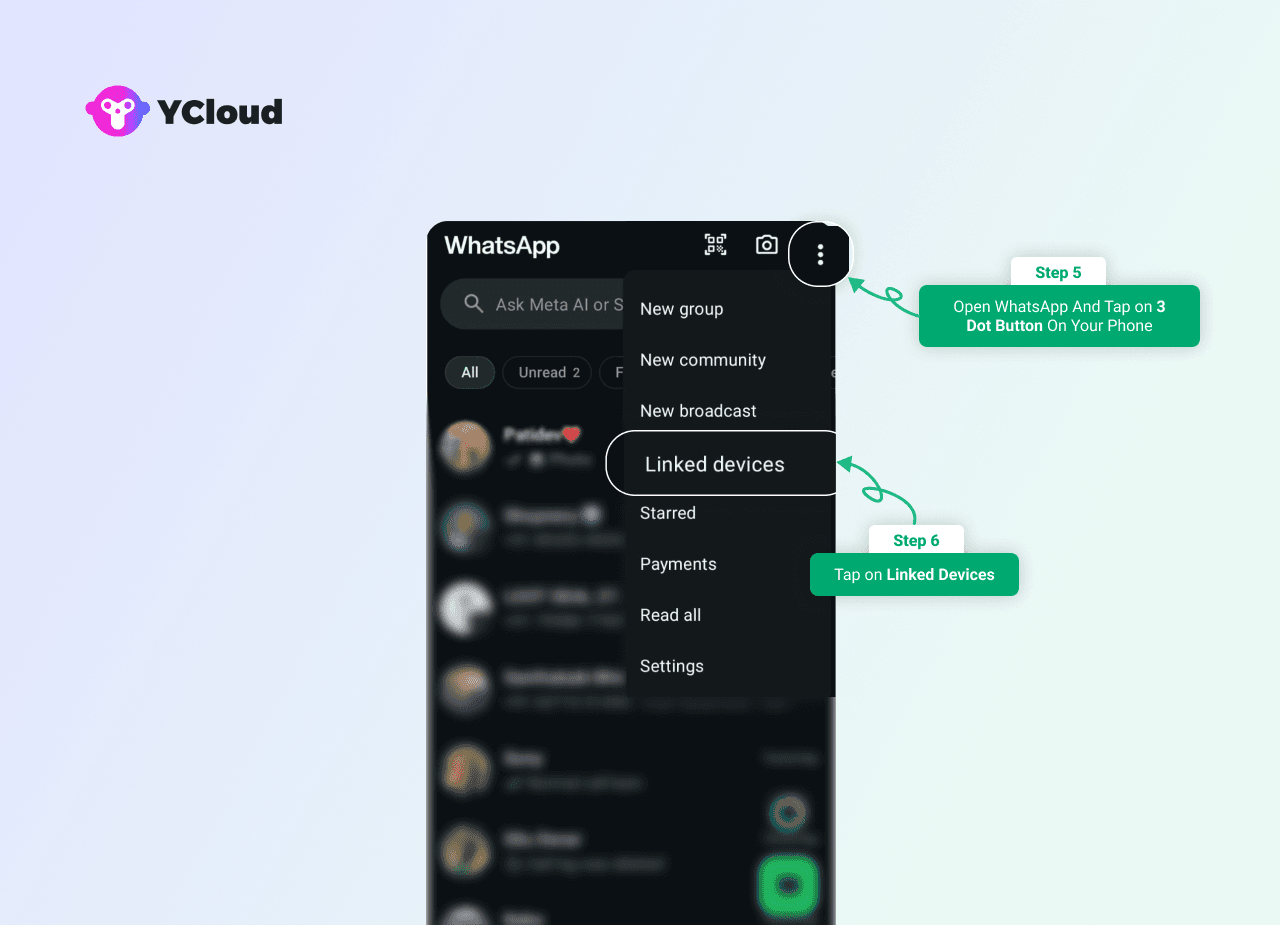
Step 3: Generate a QR Code on the New Phone
A QR code will appear on your new phone’s screen.
Step 4: Open WhatsApp on Your Primary Phone
On your main phone, open WhatsApp → go to Settings (iPhone) or Three dots > Linked Devices (Android) → tap Link a Device.
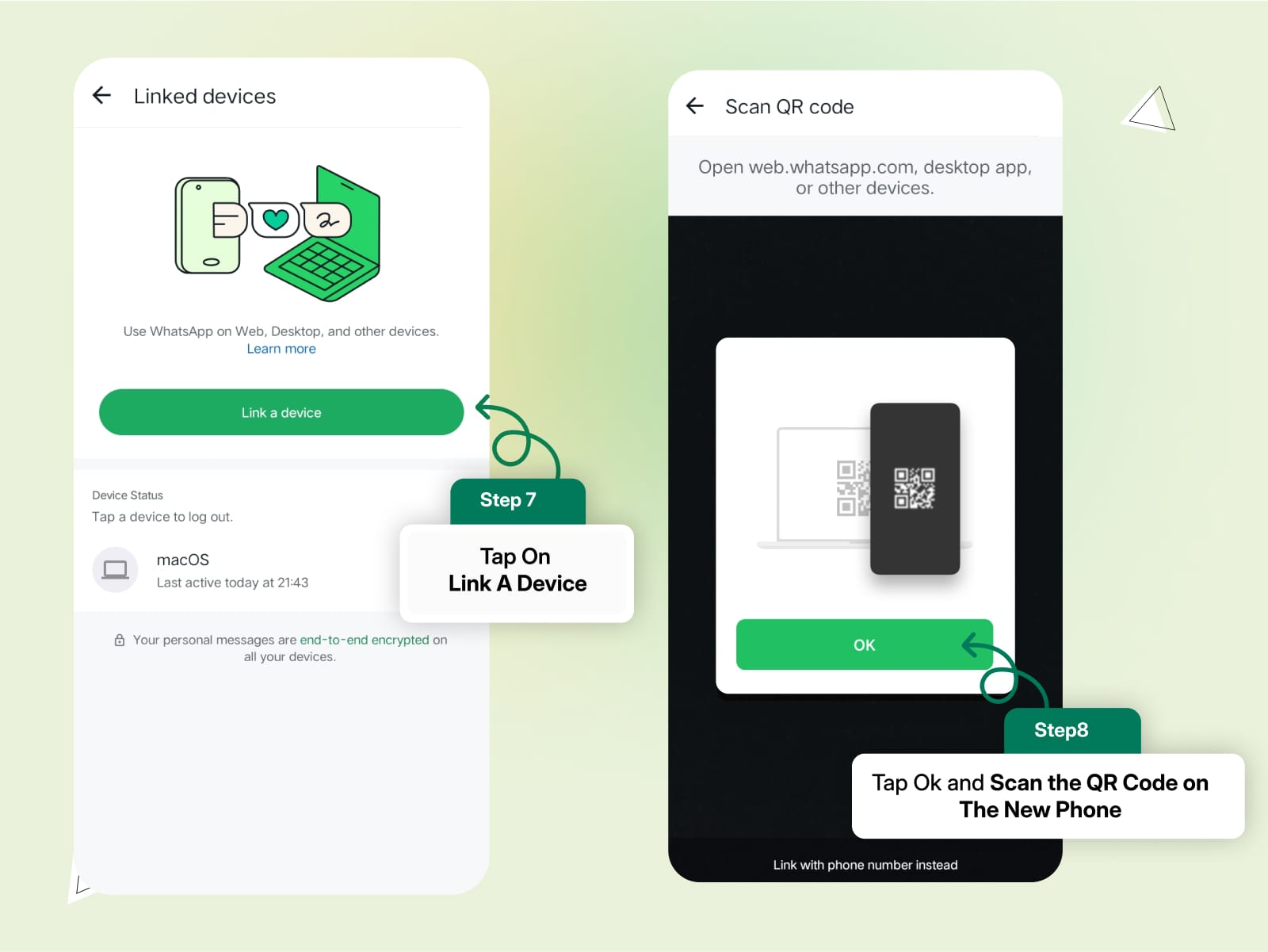
Step 5: Scan the QR Code
Use your primary phone’s QR scanner to scan the QR code displayed on the new phone. Once scanned, your WhatsApp account will sync across both devices.
✅ Voila! You’ve successfully logged into WhatsApp on another phone. Both devices can now access chats, send messages, and sync updates in real time.
💡 Pro Tips:
- You can link up to 4 companion devices, including phones, browsers, or desktops.
- Some features (like viewing live location or managing broadcast lists) may still be limited on companion devices.
- For business use, consider assigning one phone as the primary admin device and linking others for team members.
- If you don’t have your primary phone handy, you can log in using your phone number, WhatsApp will send a verification code to confirm.
👉 Up next, let’s answer an important question — Is it really possible to access WhatsApp Web without a working phone?
Can You Access WhatsApp Web Without a Working Phone?
The short answer: YES, but only if you were already logged in.
WhatsApp Web requires your phone to be connected at least once during the initial setup. After that, thanks to the multi-device update, you can continue using WhatsApp Web even if your phone is switched off, out of battery, or temporarily not working.
However, there’s a catch:
- If your phone has never been linked to WhatsApp Web, you won’t be able to log in without it.
- If your phone is broken or permanently offline, you’ll need to repair it or set up WhatsApp on a new device first.
✅ In short, WhatsApp Web works without a phone only after it’s been set up with a phone at least once.
WhatsApp Web Without a Phone: What Works & What Doesn’t
✅ Works If… | ❌ Doesn’t Work If… |
Your phone was already linked to WhatsApp Web or Desktop. | You’ve never linked your phone to WhatsApp Web before. |
Your phone is temporarily offline (battery dead, no network, or switched off). | Your phone is permanently broken or lost with no replacement device. |
You reconnect your phone at least once every 14 days. | Your phone hasn’t connected in 14+ days (WhatsApp logs you out automatically). |
💡 Pro Tips:
- Your phone must reconnect at least once every 14 days, or WhatsApp will automatically log out all linked devices for security.
- For businesses, always ensure at least one admin device remains active to avoid sudden disconnections across team devices.
- If your phone is lost or broken, set up WhatsApp on a new device quickly to regain access and re-link to Web/Desktop.
👉 Up next, let’s look at how to stay logged into WhatsApp Web without depending on your iPhone or Android smartphone.
How to Stay Logged Into WhatsApp Web Without Your Phone
With WhatsApp’s multi-device update, you no longer need to keep your iPhone or Android phone online to stay connected on WhatsApp Web. Once your account is linked, WhatsApp Web continues to work independently, even if your phone is switched off, out of battery, or not connected to the internet.
Here’s how it works:
Step 1: Link WhatsApp Web to Your Phone (One-Time Setup)
Open WhatsApp on your phone → go to Linked Devices → tap Link a Device, and scan the QR code on web.whatsapp.com.
Step 2: Stay Logged In Automatically
Once linked, WhatsApp Web will keep you logged in on your browser or desktop app, even if your phone is offline.
Step 3: Re-Link Every 14 Days (If Needed)
For security, WhatsApp automatically logs you out if your phone hasn’t been active for 14 days. You’ll then need to scan the QR code again.
Notes & Limitations
- ✅ WhatsApp Web will keep working unless you manually log out.
- ✅ You can stay logged in across up to 4 devices at once.
- ❌ You’ll be logged out automatically after 14 days of no phone activity.
- ❌ Certain features (like changing account settings or viewing live location) still require your phone.
💡 Pro Tips:
- Check “Keep me signed in” on the login page to avoid unexpected logouts.
- Use the Desktop app for more reliable sessions than a browser.
- For businesses, always keep at least one device (preferably the admin’s phone) active to avoid disruptions.
👉 Up next, let’s troubleshoot what to do if WhatsApp login isn’t working.
What To Do if WhatsApp Login is Not Working?
If you’re having trouble logging into WhatsApp Web or Desktop, don’t panic, most issues can be fixed in just a few minutes. Here are the most common solutions:
1. Check Your Internet Connection
WhatsApp still relies on your phone for the first connection. Make sure both your computer and smartphone are connected to the internet.
2. Clear Browser Cookies & Cache
Old cookies can block the login process. Go to your browser settings → clear cookies for web.whatsapp.com → refresh and try again.
3. Update WhatsApp to the Latest Version
Outdated apps often cause login failures, especially for phone-number login or companion mode. Update WhatsApp from the App Store (iOS) or Google Play (Android).
4. Re-Link Your Devices
On your phone, open Settings > Linked Devices, tap the device causing issues, and hit Log Out. Then re-scan the QR code on your desktop.
5. Disable VPN or Firewall
Some VPNs and corporate firewalls block WhatsApp Web. Temporarily disable them and try logging in again.
6. Wait & Retry
If nothing works, the issue may be on WhatsApp’s end. Outages are rare but possible, wait a few minutes and try again.
💡 Pro Tips:
- Use the WhatsApp Desktop app instead of a browser for more stable performance.
- Keep your phone software updated, not just the app, OS bugs can sometimes block connections.
- For teams working in offices with strict firewalls, ask IT to whitelist web.whatsapp.com.
👉 Up next, let’s go over the features available after you log in to WhatsApp Web.
Features You Unlock After WhatsApp Web Login
Once you’ve logged into WhatsApp Web, you gain access to nearly everything you’d expect from the mobile app, now optimized for your desktop or laptop. It’s designed for speed, convenience, and productivity, making it especially valuable for business users.
1. Real-Time Chat & Group Messaging
- Send and receive instant messages one-on-one or in groups.
- Pin your most active chats for quick access.
- Use mentions (@name) in group chats for clarity.
- React to messages with emojis for faster responses.
2. Faster Typing on a Big Screen
- Type long replies, documents, or customer responses with the speed and ease of a full keyboard.
- The larger screen makes multitasking easier, especially during busy work hours.
3. Send & Receive Media from Desktop
- Upload and share photos, videos, documents, and PDFs directly from your computer.
- Drag and drop files into chats for instant sharing.
- Download media from chats and save it straight to your desktop.
4. Seamless Sync with Mobile Device
- Messages, deletions, and edits update instantly across devices.
- Groups, contacts, and profiles stay in sync.
- All conversations remain end-to-end encrypted, ensuring your privacy.
✅ Together, these features turn WhatsApp Web into a powerful extension of your mobile app, perfect for handling conversations while working on a bigger screen.
💡 Pro Tips:
- Enable desktop notifications to never miss a customer message while multitasking.
- Use keyboard shortcuts (like Ctrl + Shift + [ or ]) to switch between chats faster.
- Pair WhatsApp Web with cloud storage tools for quicker file sharing in teams.
👉 Up next, let’s troubleshoot further with common WhatsApp Web login issues and how to fix them.
Troubleshooting Common WhatsApp Login Issues
Even after following all the steps, you may sometimes hit roadblocks while logging in. Don’t worry... most issues have simple fixes. Here are the most common ones:
1. Didn’t Receive the Verification Code?
- Double-check that you entered the correct phone number (including country code).
- Make sure your phone has a stable internet connection and can receive SMS or calls.
2. QR Code Not Scanning?
- Clean your phone’s camera lens and make sure the QR code on your screen is clearly visible.
- Increase screen brightness on your computer for better scanning.
- Hold your phone steady and align the QR code within the scanner frame.
3. Logged Out Automatically?
- WhatsApp Web logs you out if your phone hasn’t been active in 14+ days.
- Connectivity drops or app updates can also trigger a logout.
- Simply re-scan the QR code from your phone to restore access.
💡 Pro Tips:
- If QR codes consistently fail, try using the WhatsApp Desktop app, it’s more stable than browsers.
- For verification code delays, toggle Airplane mode on/off or restart your phone.
- Avoid using public Wi-Fi for logins, firewalls may block WhatsApp servers.
👉 Up next, let’s discuss essential security tips to keep your WhatsApp login safe.
Security Tips After WhatsApp Login
Once you’ve logged into WhatsApp Web or Desktop, keeping your account secure should be a top priority, especially if you’re handling sensitive customer conversations. Here are key steps to safeguard your account:
1. Enable Two-Step Verification
Add an extra layer of security so even if someone has your SIM or phone, they can’t easily log in.
- Open WhatsApp → go to Settings > Account > Two-Step Verification
- Tap Enable and set a secure 6-digit PIN
- Add a recovery email address (recommended in case you forget your PIN)
- You’ll be asked to enter this PIN periodically and when re-registering your phone number
2. Review Your Privacy Settings
Control who sees your information and when you’re active.
- Last Seen & Online – set it to “Contacts” or “Nobody”
- Profile Photo & About – restrict visibility if needed
- Status – share updates only with chosen contacts
- Read Receipts – toggle off if you want more privacy
3. Best Practices for WhatsApp Web Login Security
- ✅ Always log out from public or shared devices after use
- ✅ Use a strong phone lock and secure your WhatsApp with a PIN or biometric lock
- ✅ Never click on suspicious links shared via WhatsApp Web
- ✅ Enable notifications for new linked devices under “Linked Devices” in your app
- ❌ Avoid ticking “Keep me signed in” on shared or work computers
- 🔍 Regularly check your Linked Devices list and log out any session you don’t recognize
💡 Pro Tips:
- Businesses should assign one admin device and review linked sessions weekly.
- If you suspect unauthorized access, immediately log out of all devices via Settings > Linked Devices.
- Combine WhatsApp login security with two-factor authentication on your email/phone account for maximum protection.
👉 Up next, let’s see how to log out of WhatsApp Web securely.
How to Log Out of WhatsApp Web Securely?
Logging out of WhatsApp Web is essential for keeping your chats private, especially if you’ve used a shared or public computer. Thankfully, WhatsApp makes it easy to sign out both from your browser and remotely through your phone.
🔹 Method 1: Log Out from the Browser (Directly)
Step 1: On your active WhatsApp Web session, click the three-dot menu (⋮) at the top of your chat list.
Step 2: Select Log out from the dropdown menu.
Step 3: Your session will end instantly, and all chats will disappear from the screen.

🔹 Method 2: Log Out Remotely from Your Phone
If you forgot to log out on a public or shared computer, you can disconnect that session remotely.
- On Android:
Open WhatsApp → tap the three dots → select Linked Devices
Tap the browser/device you want to remove → select Log out
- On iPhone:
Open WhatsApp Settings → tap Linked Devices
Select the active session → tap Log out
💡 Pro Tips:
- Always log out after using WhatsApp Web on public or shared devices.
- For businesses, schedule periodic checks of Linked Devices to make sure only authorized systems are connected.
- If you suspect unauthorized access, choose Log out from all devices for instant security.
👉 Up next, let’s explore how businesses can move beyond regular logins with the WhatsApp Business API to reach global audiences.
Are You Looking to Reach Global Audiences on WhatsApp?
For small businesses or solo entrepreneurs, the WhatsApp Business App works well enough. It lets you chat with customers, share quick updates, and manage conversations on the go.
But if you’re a growing or enterprise-level business, the Business App quickly hits its limits. Here’s why:
❌ Broadcast Limit – You can only send bulk messages to 256 contacts, and only to those who have saved your number.
❌ No Analytics – You can’t measure campaign results or customer engagement.
❌ No Agent Tracking – Impossible to monitor team performance or conversation handling.
❌ No Chatbot Support – Automated customer support with chatbots isn’t possible.
❌ No CRM Integration – You can’t connect WhatsApp with Salesforce, HubSpot, or other business tools.
❌ No Automated Notifications – Order updates, reminders, or alerts can’t be automated.
❌ No Interactive Features – Messages can’t include clickable buttons or structured templates.
❌ No Blue Tick Verification – The Business App doesn’t support WhatsApp’s official Blue Tick verification badge.
👉 In short, the WhatsApp Business App is built for small-scale use, not for businesses aiming to engage global audiences at scale.
So what’s the solution? The answer lies in the WhatsApp Business API, which is designed to handle automation, scalability, analytics, and integrations for businesses of all sizes.
👉 Up next: let’s dive into how WhatsApp Business API helps you overcome these limitations and reach global audiences at scale.
Connect with Global Audiences at Scale with WhatsApp Business API
For small businesses, the WhatsApp Business App works fine, but once you start scaling, its limits become frustrating. You can only broadcast to 256 contacts, there’s no analytics, no chatbot automation, no CRM integrations, no team inbox, and you can’t even get the verified Blue Tick. For growing businesses, these gaps directly impact customer engagement, response times, and revenue.
That’s where the WhatsApp Business API comes in. Launched by Meta in 2018, it was designed specifically for medium to large businesses to connect with audiences at scale. But here’s the catch: unlike the Business App, you can’t just download it from the App Store or Play Store. To use it, you need the help of an official WhatsApp Business Solution Provider (BSP) like YCloud.
With YCloud’s WhatsApp Business API platform, you can:
- 🚀 Send broadcasts to unlimited opted-in users, not just 256.
- 🔔 Automate notifications for order confirmations, delivery updates, reminders, invoices, payment links, and more.
- 🤖 Deploy AI-powered WhatsApp chatbots to handle FAQs, lead qualification, and customer support 24/7.
- 👥 Add unlimited agents with a shared team inbox and role-based routing to improve support efficiency.
- 📊 Track performance with real-time analytics, monitor campaigns, customer interactions, and agent productivity.
- 🔗 Integrate with your favorite CRMs and tools like Shopify, WooCommerce, Salesforce, Zapier, and more.
- ✅ Get the official Blue Tick verification to build trust and boost message open rates.
- 🛒 Enable commerce directly in WhatsApp with catalog sharing, AI-powered order bots, and seamless payments.
👉 The outcome? Businesses using YCloud move beyond basic chat to deliver personalized, scalable, and automated customer experiences on WhatsApp, all while staying secure, compliant, and efficient.
💡 Pro Tip: If your business is aiming to reach thousands (or millions) of customers globally, moving from the Business App to the WhatsApp Business API with YCloud is not an upgrade, it’s a necessity.
👉 Up next: let’s break down how to get started with WhatsApp Business API using YCloud.
How to Kickstart Your WhatsApp Business API Journey with YCloud
Kindly click on the Below Banner to book a FREE DEMO and learn more about our product offering, features and pricing plans.
Built with AI at its core, YCloud is the ultimate WhatsApp marketing and automation solution, giving you everything you need in one powerful platform.
Now market, sell, support, and scale your business by 10X with YCloud!
Ready to try? Explore How to Get YCloud for FREE next!
How to Get YCloud for FREE?
It's Simple!
Subscribe to our FREE plan and get a free lifetime experience of YCloud with unlimited messaging API.
[Book a FREE Demo] and see how YCloud can power up your WhatsApp strategy!
🚀 Try YCloud today and see how effortless WhatsApp automation can be when you have the right partner.
Wrapping Up!
WhatsApp is no longer just a messaging app, it’s the fastest-growing channel for customer engagement, sales, and support. With YCloud’s WhatsApp Business API, you don’t just connect with your audience, you scale smarter, automate faster, and build stronger customer relationships.
Whether you’re a growing business or an enterprise, YCloud gives you the tools to market, sell, and support, all in one platform, with zero hassle.
The future of customer engagement is on WhatsApp. With YCloud, you can market, sell, and support at scale—all in one powerful platform.
🚀 [Book Your FREE Demo Today] and turn conversations into conversions.
Suggested Read:
- Best WhatsApp Automation Tools to Boost Sales, Support & Marketing
- Top WhatsApp Message Schedulers to Automate Sales, Support & Marketing in 2026
- How To Do WhatsApp Blast Without Getting Banned?
- YCloud vs WATI: Who's the Best Alternative?
- Best WhatsApp Blast Softwares to Skyrocket Your Campaigns
- Top 25 WhatsApp API Providers in Indonesia Compared (2026 Edition)
- How to Apply for WhatsApp Blue Tick: 2026 Exclusive Guide
- WhatsApp Business API Pricing Update: Everything Changes from July 1, 2025
- WhatsApp Business App Coexistence Guide: Everything Explained!
- Meta's WhatsApp API Message Template Category Guidelines Update: Effective July 1st, 2025
- 20 Tried-and-Tested Customer Service Software to Supercharge Your Support Strategy
- 100+ Crazy WhatsApp Statistics to Shape Your WhatsApp Marketing Strategy
- Top 50 WhatsApp API and WhatsApp Chatbot Providers in India - 2026 Edition
- The Ultimate Guide to the 25 Best WhatsApp API Providers in Latin America (LATAM): Pros, Cons & Pricing Compared
- How to Use WhatsApp Web on Browsers, MacBook and Windows Laptop
- 25 Best WhatsApp Bulk Message Senders That Won’t Get Your Number Banned!
- How to Send WhatsApp Message Without Saving Number: 10 Quick and Easy Hacks
- WhatsApp Support Guide: Legit Ways to Get Help Without Getting Scammed
- Looking Beyond Twilio? Here Are 25 Better Twilio Alternatives for 2026
- YCloud's Ultimate Guide to WhatsApp CRM
- 50 Best WhatsApp Marketing Tools to Automate, Engage & Sell More
- We Tested 25 SendGrid Alternatives and Here’s What We Found
- Top 30 WhatsApp API Providers in Dubai (2026) with Features, Pros, Cons & Pricing
Case Studies:
- How AdaKami Achieved a 30% Cost Reduction and 15% Faster Debt Recollection with WhatsApp
- How Urbanic and Savana Collected 58K+ Reviews with YCloud’s WhatsApp Automation
- How CHAGEE Achieved a 20% Sales Boost and 30% Faster Order Pickup with YCloud
